Operations Management Research Survey
VerifiedAdded on 2020/10/05
|17
|5911
|256
AI Summary
This assignment requires a thorough analysis of operations management research papers and articles from various sources. It involves identifying relevant studies on topics like supply chain management, logistics, port logistics management, business process management, industry 4.0 framework, and servitization. The assignment also includes an online resource about the role of an operations manager, which provides additional context for understanding the importance of operations management in businesses. A suitable title, meta title, and meta description have been generated based on the content of the assignment to help with publishing it on Desklib.
Contribute Materials
Your contribution can guide someone’s learning journey. Share your
documents today.
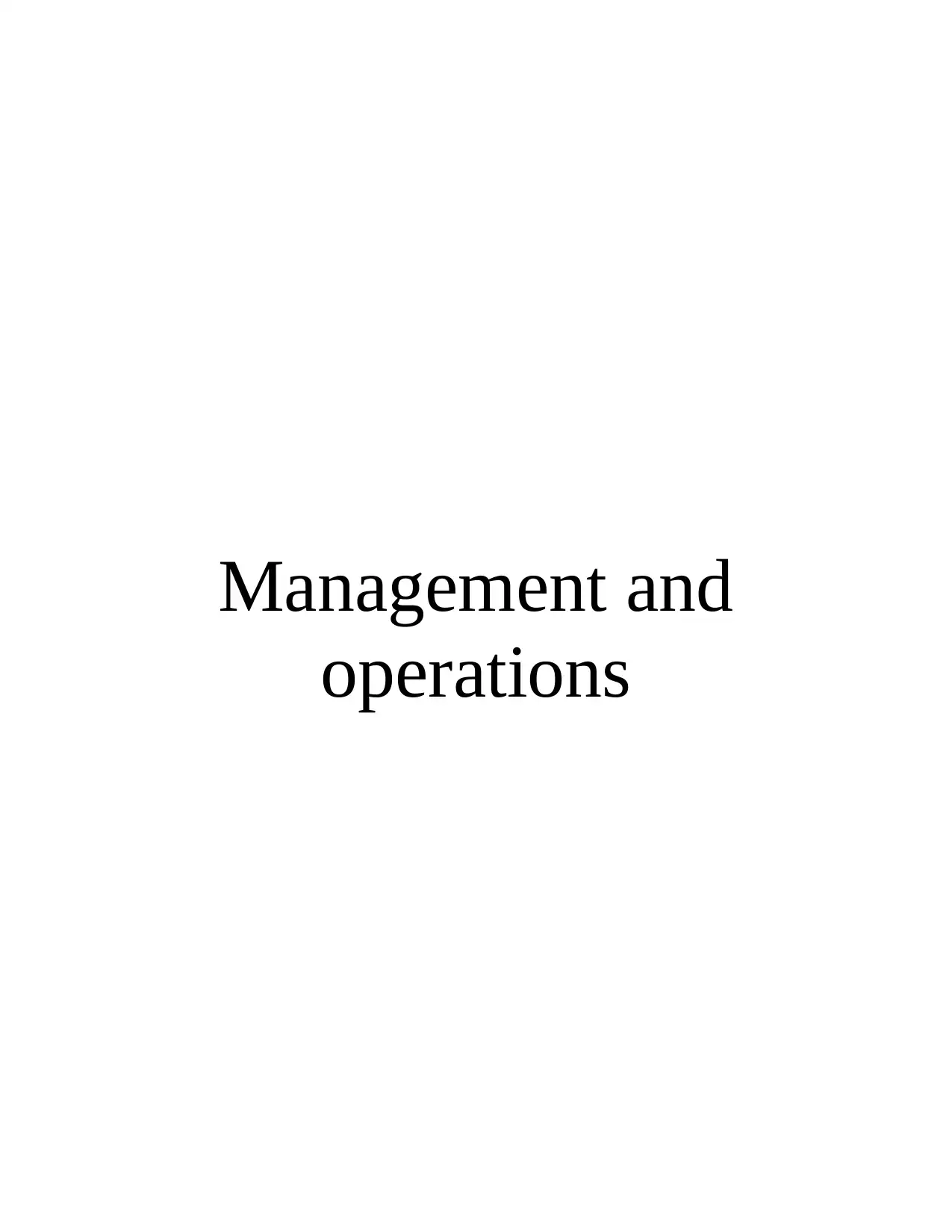
Management and
operations
operations
Secure Best Marks with AI Grader
Need help grading? Try our AI Grader for instant feedback on your assignments.
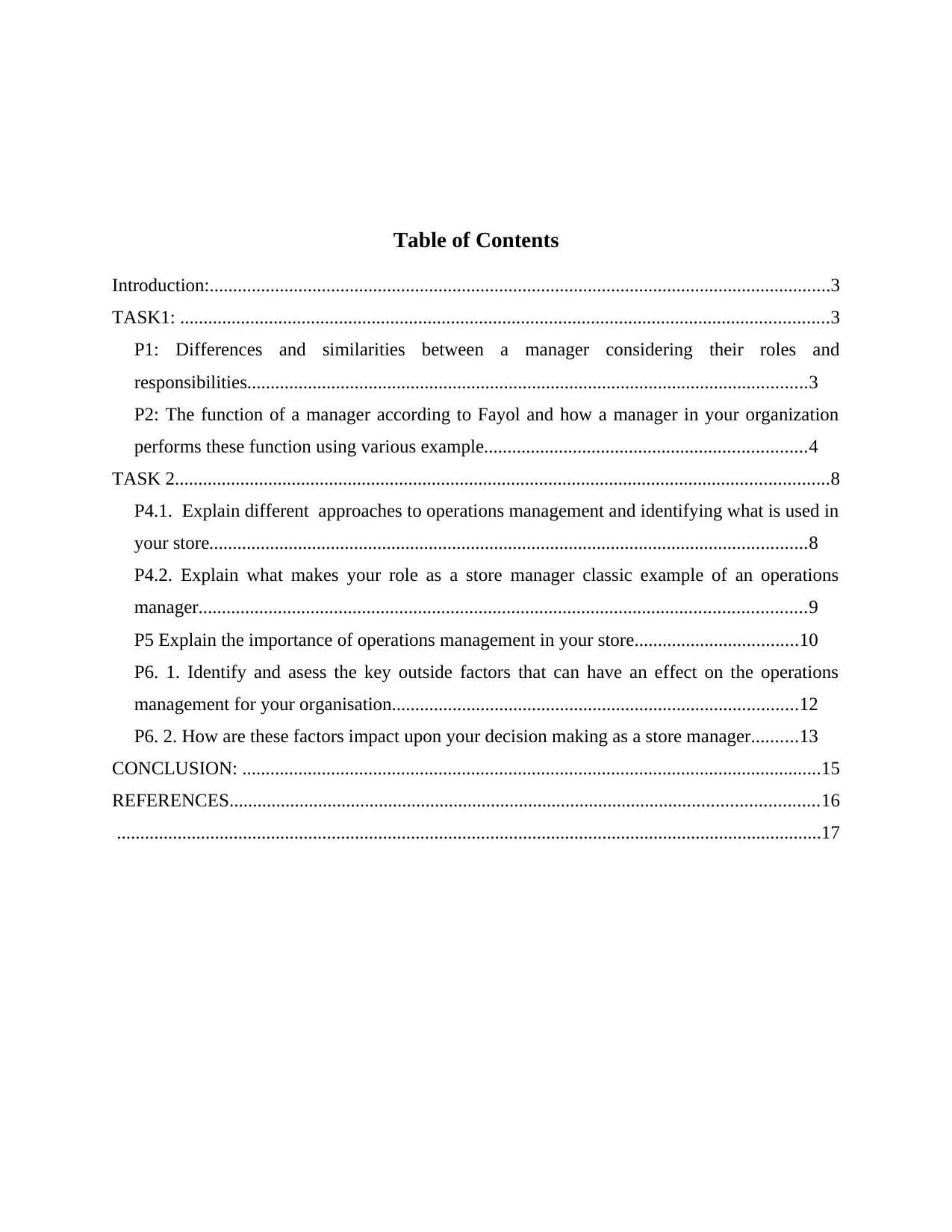
Table of Contents
Introduction:.....................................................................................................................................3
TASK1: ...........................................................................................................................................3
P1: Differences and similarities between a manager considering their roles and
responsibilities........................................................................................................................3
P2: The function of a manager according to Fayol and how a manager in your organization
performs these function using various example.....................................................................4
TASK 2............................................................................................................................................8
P4.1. Explain different approaches to operations management and identifying what is used in
your store................................................................................................................................8
P4.2. Explain what makes your role as a store manager classic example of an operations
manager..................................................................................................................................9
P5 Explain the importance of operations management in your store...................................10
P6. 1. Identify and asess the key outside factors that can have an effect on the operations
management for your organisation.......................................................................................12
P6. 2. How are these factors impact upon your decision making as a store manager..........13
CONCLUSION: ............................................................................................................................15
REFERENCES..............................................................................................................................16
.......................................................................................................................................................17
Introduction:.....................................................................................................................................3
TASK1: ...........................................................................................................................................3
P1: Differences and similarities between a manager considering their roles and
responsibilities........................................................................................................................3
P2: The function of a manager according to Fayol and how a manager in your organization
performs these function using various example.....................................................................4
TASK 2............................................................................................................................................8
P4.1. Explain different approaches to operations management and identifying what is used in
your store................................................................................................................................8
P4.2. Explain what makes your role as a store manager classic example of an operations
manager..................................................................................................................................9
P5 Explain the importance of operations management in your store...................................10
P6. 1. Identify and asess the key outside factors that can have an effect on the operations
management for your organisation.......................................................................................12
P6. 2. How are these factors impact upon your decision making as a store manager..........13
CONCLUSION: ............................................................................................................................15
REFERENCES..............................................................................................................................16
.......................................................................................................................................................17
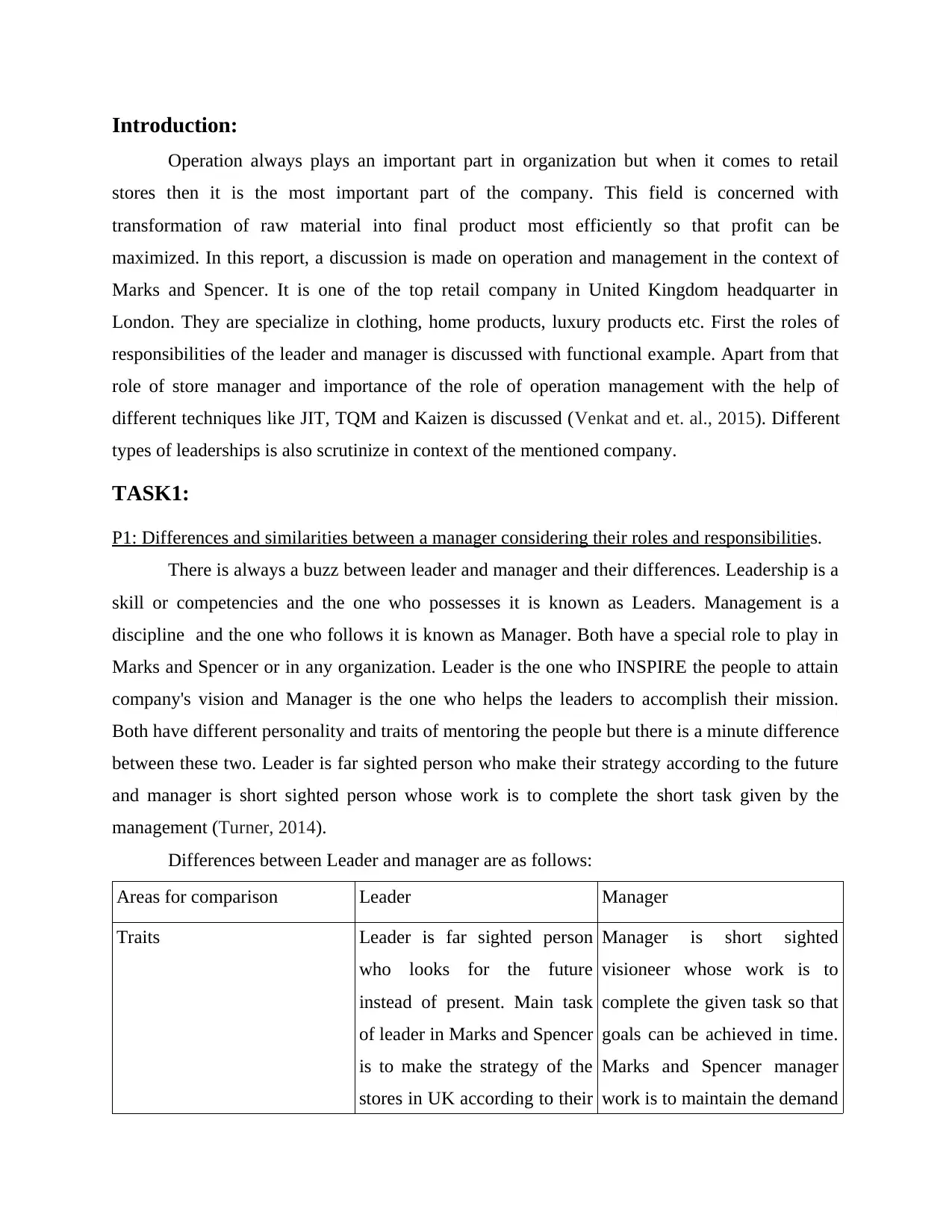
Introduction:
Operation always plays an important part in organization but when it comes to retail
stores then it is the most important part of the company. This field is concerned with
transformation of raw material into final product most efficiently so that profit can be
maximized. In this report, a discussion is made on operation and management in the context of
Marks and Spencer. It is one of the top retail company in United Kingdom headquarter in
London. They are specialize in clothing, home products, luxury products etc. First the roles of
responsibilities of the leader and manager is discussed with functional example. Apart from that
role of store manager and importance of the role of operation management with the help of
different techniques like JIT, TQM and Kaizen is discussed (Venkat and et. al., 2015). Different
types of leaderships is also scrutinize in context of the mentioned company.
TASK1:
P1: Differences and similarities between a manager considering their roles and responsibilities.
There is always a buzz between leader and manager and their differences. Leadership is a
skill or competencies and the one who possesses it is known as Leaders. Management is a
discipline and the one who follows it is known as Manager. Both have a special role to play in
Marks and Spencer or in any organization. Leader is the one who INSPIRE the people to attain
company's vision and Manager is the one who helps the leaders to accomplish their mission.
Both have different personality and traits of mentoring the people but there is a minute difference
between these two. Leader is far sighted person who make their strategy according to the future
and manager is short sighted person whose work is to complete the short task given by the
management (Turner, 2014).
Differences between Leader and manager are as follows:
Areas for comparison Leader Manager
Traits Leader is far sighted person
who looks for the future
instead of present. Main task
of leader in Marks and Spencer
is to make the strategy of the
stores in UK according to their
Manager is short sighted
visioneer whose work is to
complete the given task so that
goals can be achieved in time.
Marks and Spencer manager
work is to maintain the demand
Operation always plays an important part in organization but when it comes to retail
stores then it is the most important part of the company. This field is concerned with
transformation of raw material into final product most efficiently so that profit can be
maximized. In this report, a discussion is made on operation and management in the context of
Marks and Spencer. It is one of the top retail company in United Kingdom headquarter in
London. They are specialize in clothing, home products, luxury products etc. First the roles of
responsibilities of the leader and manager is discussed with functional example. Apart from that
role of store manager and importance of the role of operation management with the help of
different techniques like JIT, TQM and Kaizen is discussed (Venkat and et. al., 2015). Different
types of leaderships is also scrutinize in context of the mentioned company.
TASK1:
P1: Differences and similarities between a manager considering their roles and responsibilities.
There is always a buzz between leader and manager and their differences. Leadership is a
skill or competencies and the one who possesses it is known as Leaders. Management is a
discipline and the one who follows it is known as Manager. Both have a special role to play in
Marks and Spencer or in any organization. Leader is the one who INSPIRE the people to attain
company's vision and Manager is the one who helps the leaders to accomplish their mission.
Both have different personality and traits of mentoring the people but there is a minute difference
between these two. Leader is far sighted person who make their strategy according to the future
and manager is short sighted person whose work is to complete the short task given by the
management (Turner, 2014).
Differences between Leader and manager are as follows:
Areas for comparison Leader Manager
Traits Leader is far sighted person
who looks for the future
instead of present. Main task
of leader in Marks and Spencer
is to make the strategy of the
stores in UK according to their
Manager is short sighted
visioneer whose work is to
complete the given task so that
goals can be achieved in time.
Marks and Spencer manager
work is to maintain the demand
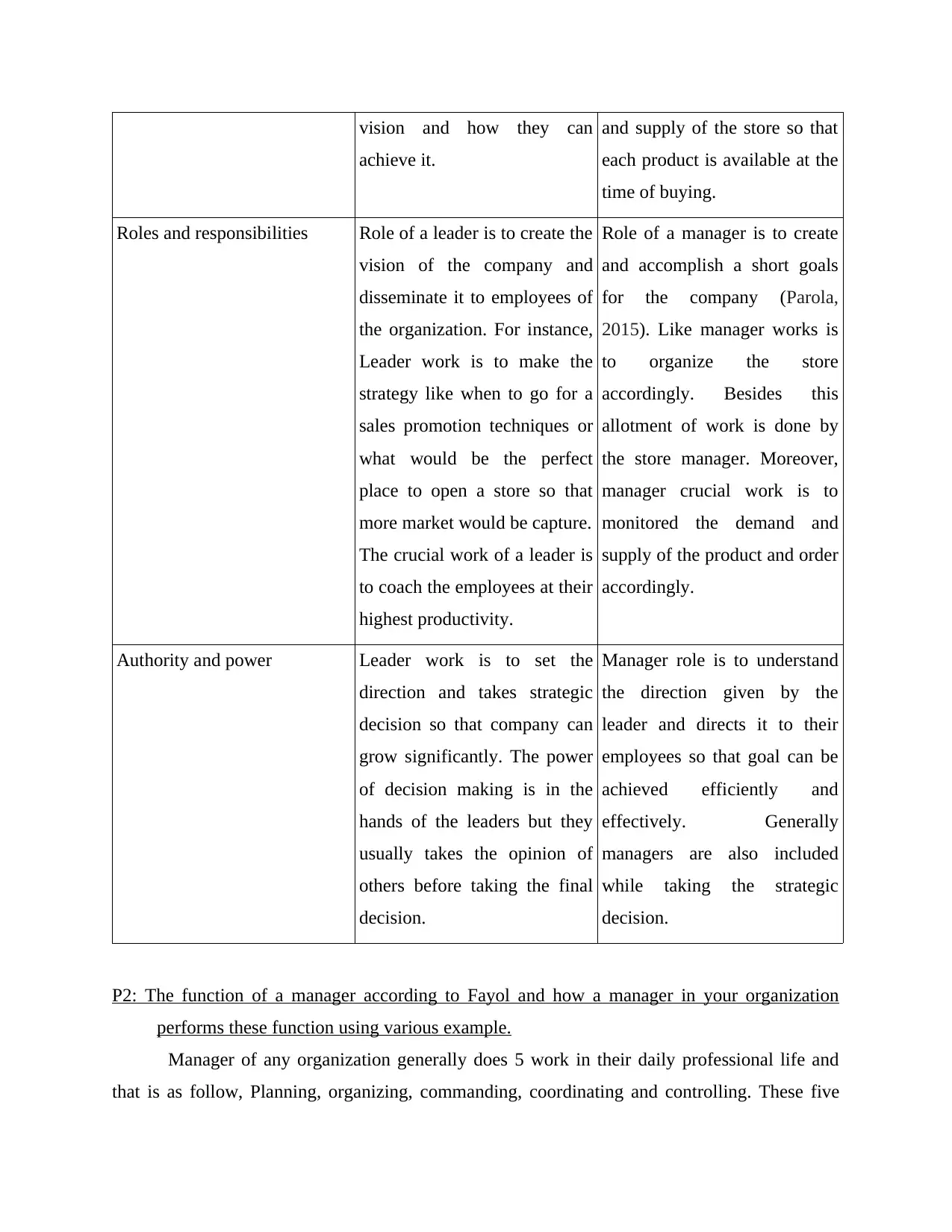
vision and how they can
achieve it.
and supply of the store so that
each product is available at the
time of buying.
Roles and responsibilities Role of a leader is to create the
vision of the company and
disseminate it to employees of
the organization. For instance,
Leader work is to make the
strategy like when to go for a
sales promotion techniques or
what would be the perfect
place to open a store so that
more market would be capture.
The crucial work of a leader is
to coach the employees at their
highest productivity.
Role of a manager is to create
and accomplish a short goals
for the company (Parola,
2015). Like manager works is
to organize the store
accordingly. Besides this
allotment of work is done by
the store manager. Moreover,
manager crucial work is to
monitored the demand and
supply of the product and order
accordingly.
Authority and power Leader work is to set the
direction and takes strategic
decision so that company can
grow significantly. The power
of decision making is in the
hands of the leaders but they
usually takes the opinion of
others before taking the final
decision.
Manager role is to understand
the direction given by the
leader and directs it to their
employees so that goal can be
achieved efficiently and
effectively. Generally
managers are also included
while taking the strategic
decision.
P2: The function of a manager according to Fayol and how a manager in your organization
performs these function using various example.
Manager of any organization generally does 5 work in their daily professional life and
that is as follow, Planning, organizing, commanding, coordinating and controlling. These five
achieve it.
and supply of the store so that
each product is available at the
time of buying.
Roles and responsibilities Role of a leader is to create the
vision of the company and
disseminate it to employees of
the organization. For instance,
Leader work is to make the
strategy like when to go for a
sales promotion techniques or
what would be the perfect
place to open a store so that
more market would be capture.
The crucial work of a leader is
to coach the employees at their
highest productivity.
Role of a manager is to create
and accomplish a short goals
for the company (Parola,
2015). Like manager works is
to organize the store
accordingly. Besides this
allotment of work is done by
the store manager. Moreover,
manager crucial work is to
monitored the demand and
supply of the product and order
accordingly.
Authority and power Leader work is to set the
direction and takes strategic
decision so that company can
grow significantly. The power
of decision making is in the
hands of the leaders but they
usually takes the opinion of
others before taking the final
decision.
Manager role is to understand
the direction given by the
leader and directs it to their
employees so that goal can be
achieved efficiently and
effectively. Generally
managers are also included
while taking the strategic
decision.
P2: The function of a manager according to Fayol and how a manager in your organization
performs these function using various example.
Manager of any organization generally does 5 work in their daily professional life and
that is as follow, Planning, organizing, commanding, coordinating and controlling. These five
Secure Best Marks with AI Grader
Need help grading? Try our AI Grader for instant feedback on your assignments.
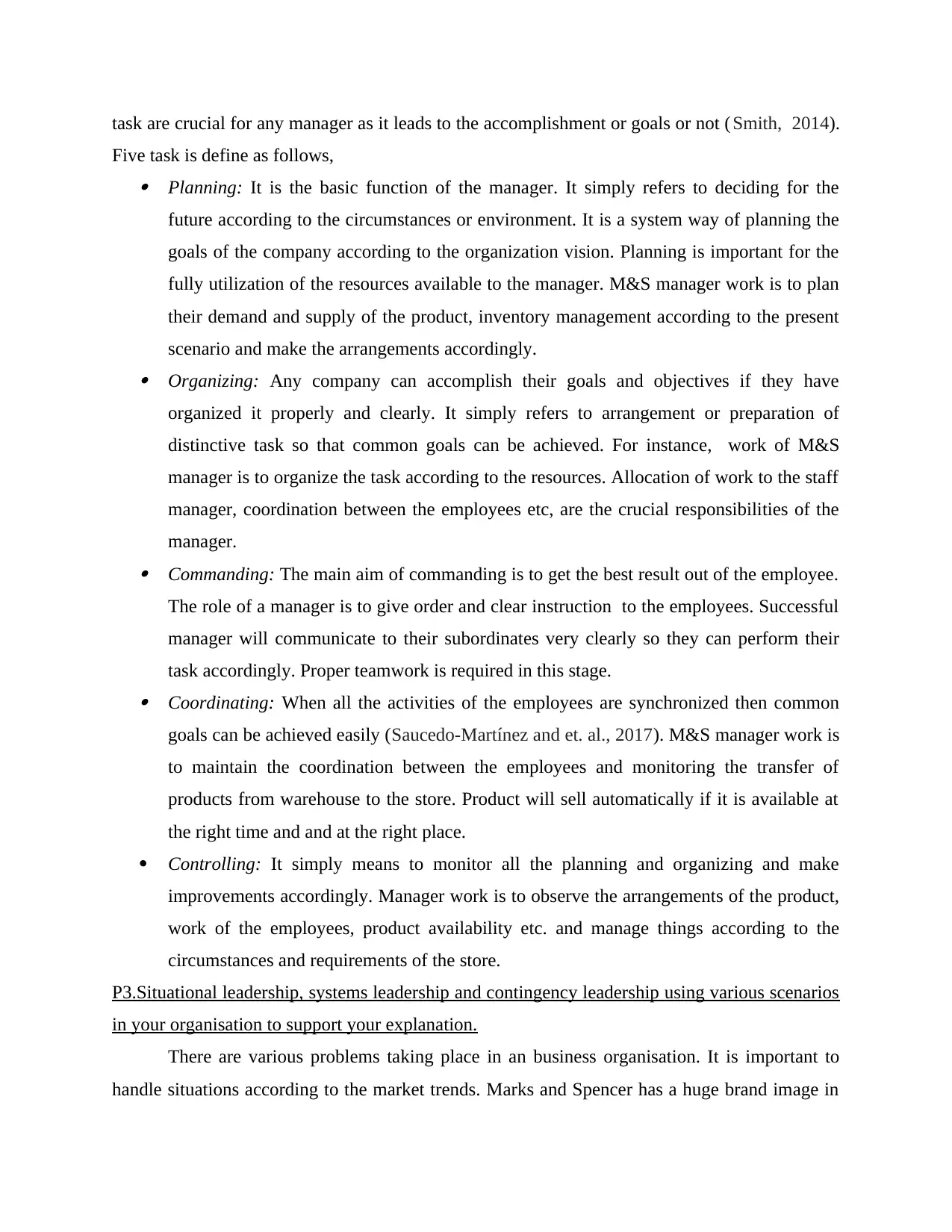
task are crucial for any manager as it leads to the accomplishment or goals or not ( Smith, 2014).
Five task is define as follows, Planning: It is the basic function of the manager. It simply refers to deciding for the
future according to the circumstances or environment. It is a system way of planning the
goals of the company according to the organization vision. Planning is important for the
fully utilization of the resources available to the manager. M&S manager work is to plan
their demand and supply of the product, inventory management according to the present
scenario and make the arrangements accordingly. Organizing: Any company can accomplish their goals and objectives if they have
organized it properly and clearly. It simply refers to arrangement or preparation of
distinctive task so that common goals can be achieved. For instance, work of M&S
manager is to organize the task according to the resources. Allocation of work to the staff
manager, coordination between the employees etc, are the crucial responsibilities of the
manager. Commanding: The main aim of commanding is to get the best result out of the employee.
The role of a manager is to give order and clear instruction to the employees. Successful
manager will communicate to their subordinates very clearly so they can perform their
task accordingly. Proper teamwork is required in this stage. Coordinating: When all the activities of the employees are synchronized then common
goals can be achieved easily (Saucedo-Martínez and et. al., 2017). M&S manager work is
to maintain the coordination between the employees and monitoring the transfer of
products from warehouse to the store. Product will sell automatically if it is available at
the right time and and at the right place.
Controlling: It simply means to monitor all the planning and organizing and make
improvements accordingly. Manager work is to observe the arrangements of the product,
work of the employees, product availability etc. and manage things according to the
circumstances and requirements of the store.
P3.Situational leadership, systems leadership and contingency leadership using various scenarios
in your organisation to support your explanation.
There are various problems taking place in an business organisation. It is important to
handle situations according to the market trends. Marks and Spencer has a huge brand image in
Five task is define as follows, Planning: It is the basic function of the manager. It simply refers to deciding for the
future according to the circumstances or environment. It is a system way of planning the
goals of the company according to the organization vision. Planning is important for the
fully utilization of the resources available to the manager. M&S manager work is to plan
their demand and supply of the product, inventory management according to the present
scenario and make the arrangements accordingly. Organizing: Any company can accomplish their goals and objectives if they have
organized it properly and clearly. It simply refers to arrangement or preparation of
distinctive task so that common goals can be achieved. For instance, work of M&S
manager is to organize the task according to the resources. Allocation of work to the staff
manager, coordination between the employees etc, are the crucial responsibilities of the
manager. Commanding: The main aim of commanding is to get the best result out of the employee.
The role of a manager is to give order and clear instruction to the employees. Successful
manager will communicate to their subordinates very clearly so they can perform their
task accordingly. Proper teamwork is required in this stage. Coordinating: When all the activities of the employees are synchronized then common
goals can be achieved easily (Saucedo-Martínez and et. al., 2017). M&S manager work is
to maintain the coordination between the employees and monitoring the transfer of
products from warehouse to the store. Product will sell automatically if it is available at
the right time and and at the right place.
Controlling: It simply means to monitor all the planning and organizing and make
improvements accordingly. Manager work is to observe the arrangements of the product,
work of the employees, product availability etc. and manage things according to the
circumstances and requirements of the store.
P3.Situational leadership, systems leadership and contingency leadership using various scenarios
in your organisation to support your explanation.
There are various problems taking place in an business organisation. It is important to
handle situations according to the market trends. Marks and Spencer has a huge brand image in
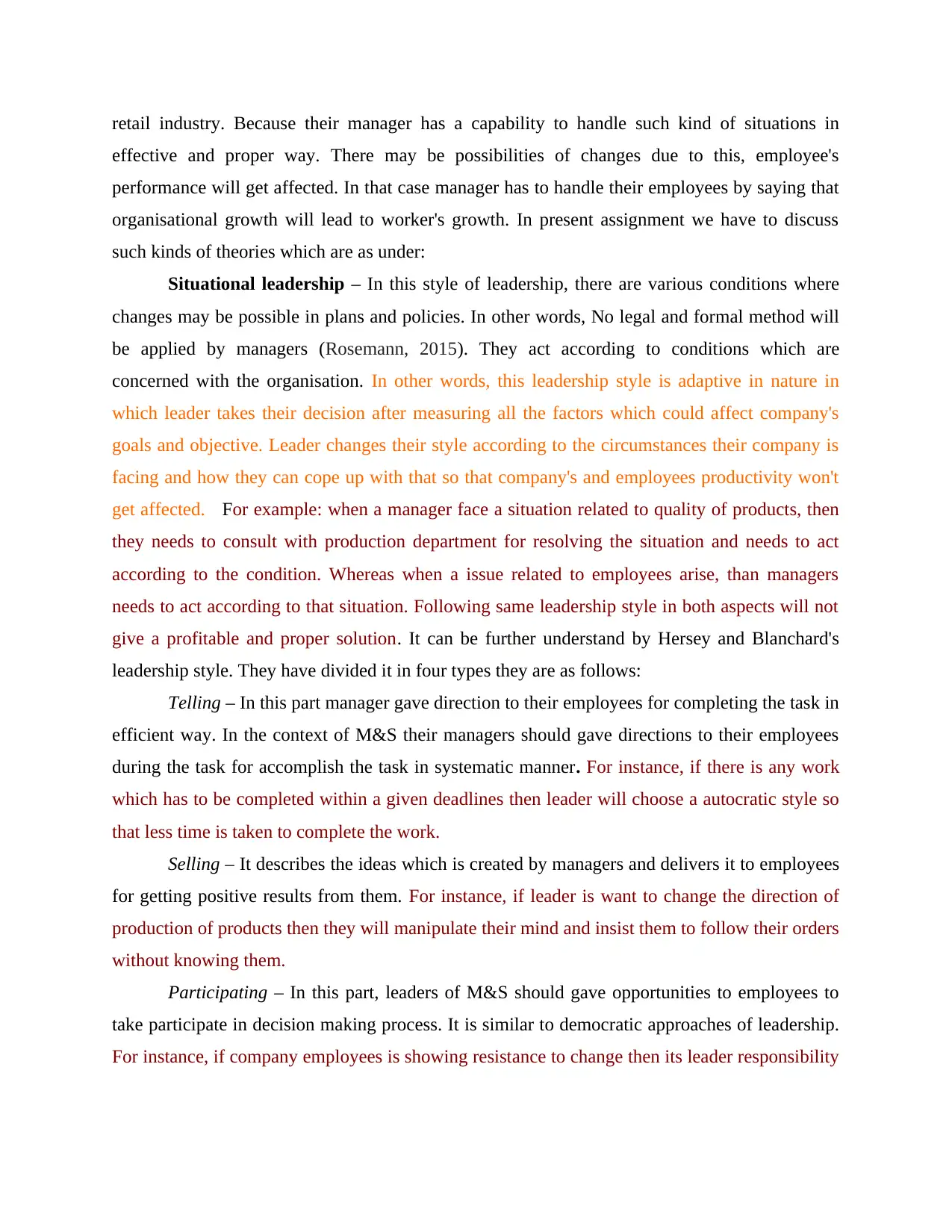
retail industry. Because their manager has a capability to handle such kind of situations in
effective and proper way. There may be possibilities of changes due to this, employee's
performance will get affected. In that case manager has to handle their employees by saying that
organisational growth will lead to worker's growth. In present assignment we have to discuss
such kinds of theories which are as under:
Situational leadership – In this style of leadership, there are various conditions where
changes may be possible in plans and policies. In other words, No legal and formal method will
be applied by managers (Rosemann, 2015). They act according to conditions which are
concerned with the organisation. In other words, this leadership style is adaptive in nature in
which leader takes their decision after measuring all the factors which could affect company's
goals and objective. Leader changes their style according to the circumstances their company is
facing and how they can cope up with that so that company's and employees productivity won't
get affected. For example: when a manager face a situation related to quality of products, then
they needs to consult with production department for resolving the situation and needs to act
according to the condition. Whereas when a issue related to employees arise, than managers
needs to act according to that situation. Following same leadership style in both aspects will not
give a profitable and proper solution. It can be further understand by Hersey and Blanchard's
leadership style. They have divided it in four types they are as follows:
Telling – In this part manager gave direction to their employees for completing the task in
efficient way. In the context of M&S their managers should gave directions to their employees
during the task for accomplish the task in systematic manner. For instance, if there is any work
which has to be completed within a given deadlines then leader will choose a autocratic style so
that less time is taken to complete the work.
Selling – It describes the ideas which is created by managers and delivers it to employees
for getting positive results from them. For instance, if leader is want to change the direction of
production of products then they will manipulate their mind and insist them to follow their orders
without knowing them.
Participating – In this part, leaders of M&S should gave opportunities to employees to
take participate in decision making process. It is similar to democratic approaches of leadership.
For instance, if company employees is showing resistance to change then its leader responsibility
effective and proper way. There may be possibilities of changes due to this, employee's
performance will get affected. In that case manager has to handle their employees by saying that
organisational growth will lead to worker's growth. In present assignment we have to discuss
such kinds of theories which are as under:
Situational leadership – In this style of leadership, there are various conditions where
changes may be possible in plans and policies. In other words, No legal and formal method will
be applied by managers (Rosemann, 2015). They act according to conditions which are
concerned with the organisation. In other words, this leadership style is adaptive in nature in
which leader takes their decision after measuring all the factors which could affect company's
goals and objective. Leader changes their style according to the circumstances their company is
facing and how they can cope up with that so that company's and employees productivity won't
get affected. For example: when a manager face a situation related to quality of products, then
they needs to consult with production department for resolving the situation and needs to act
according to the condition. Whereas when a issue related to employees arise, than managers
needs to act according to that situation. Following same leadership style in both aspects will not
give a profitable and proper solution. It can be further understand by Hersey and Blanchard's
leadership style. They have divided it in four types they are as follows:
Telling – In this part manager gave direction to their employees for completing the task in
efficient way. In the context of M&S their managers should gave directions to their employees
during the task for accomplish the task in systematic manner. For instance, if there is any work
which has to be completed within a given deadlines then leader will choose a autocratic style so
that less time is taken to complete the work.
Selling – It describes the ideas which is created by managers and delivers it to employees
for getting positive results from them. For instance, if leader is want to change the direction of
production of products then they will manipulate their mind and insist them to follow their orders
without knowing them.
Participating – In this part, leaders of M&S should gave opportunities to employees to
take participate in decision making process. It is similar to democratic approaches of leadership.
For instance, if company employees is showing resistance to change then its leader responsibility
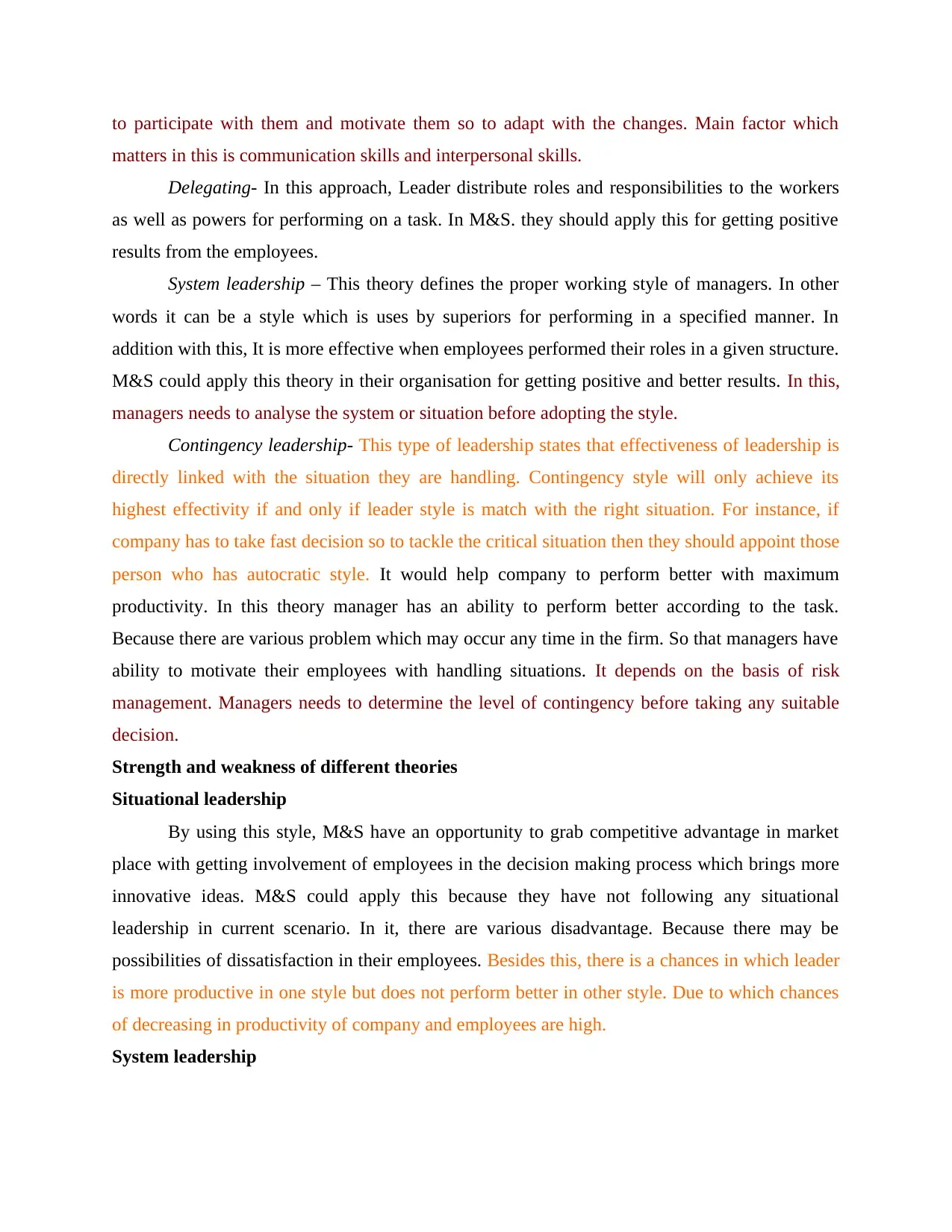
to participate with them and motivate them so to adapt with the changes. Main factor which
matters in this is communication skills and interpersonal skills.
Delegating- In this approach, Leader distribute roles and responsibilities to the workers
as well as powers for performing on a task. In M&S. they should apply this for getting positive
results from the employees.
System leadership – This theory defines the proper working style of managers. In other
words it can be a style which is uses by superiors for performing in a specified manner. In
addition with this, It is more effective when employees performed their roles in a given structure.
M&S could apply this theory in their organisation for getting positive and better results. In this,
managers needs to analyse the system or situation before adopting the style.
Contingency leadership- This type of leadership states that effectiveness of leadership is
directly linked with the situation they are handling. Contingency style will only achieve its
highest effectivity if and only if leader style is match with the right situation. For instance, if
company has to take fast decision so to tackle the critical situation then they should appoint those
person who has autocratic style. It would help company to perform better with maximum
productivity. In this theory manager has an ability to perform better according to the task.
Because there are various problem which may occur any time in the firm. So that managers have
ability to motivate their employees with handling situations. It depends on the basis of risk
management. Managers needs to determine the level of contingency before taking any suitable
decision.
Strength and weakness of different theories
Situational leadership
By using this style, M&S have an opportunity to grab competitive advantage in market
place with getting involvement of employees in the decision making process which brings more
innovative ideas. M&S could apply this because they have not following any situational
leadership in current scenario. In it, there are various disadvantage. Because there may be
possibilities of dissatisfaction in their employees. Besides this, there is a chances in which leader
is more productive in one style but does not perform better in other style. Due to which chances
of decreasing in productivity of company and employees are high.
System leadership
matters in this is communication skills and interpersonal skills.
Delegating- In this approach, Leader distribute roles and responsibilities to the workers
as well as powers for performing on a task. In M&S. they should apply this for getting positive
results from the employees.
System leadership – This theory defines the proper working style of managers. In other
words it can be a style which is uses by superiors for performing in a specified manner. In
addition with this, It is more effective when employees performed their roles in a given structure.
M&S could apply this theory in their organisation for getting positive and better results. In this,
managers needs to analyse the system or situation before adopting the style.
Contingency leadership- This type of leadership states that effectiveness of leadership is
directly linked with the situation they are handling. Contingency style will only achieve its
highest effectivity if and only if leader style is match with the right situation. For instance, if
company has to take fast decision so to tackle the critical situation then they should appoint those
person who has autocratic style. It would help company to perform better with maximum
productivity. In this theory manager has an ability to perform better according to the task.
Because there are various problem which may occur any time in the firm. So that managers have
ability to motivate their employees with handling situations. It depends on the basis of risk
management. Managers needs to determine the level of contingency before taking any suitable
decision.
Strength and weakness of different theories
Situational leadership
By using this style, M&S have an opportunity to grab competitive advantage in market
place with getting involvement of employees in the decision making process which brings more
innovative ideas. M&S could apply this because they have not following any situational
leadership in current scenario. In it, there are various disadvantage. Because there may be
possibilities of dissatisfaction in their employees. Besides this, there is a chances in which leader
is more productive in one style but does not perform better in other style. Due to which chances
of decreasing in productivity of company and employees are high.
System leadership
Paraphrase This Document
Need a fresh take? Get an instant paraphrase of this document with our AI Paraphraser
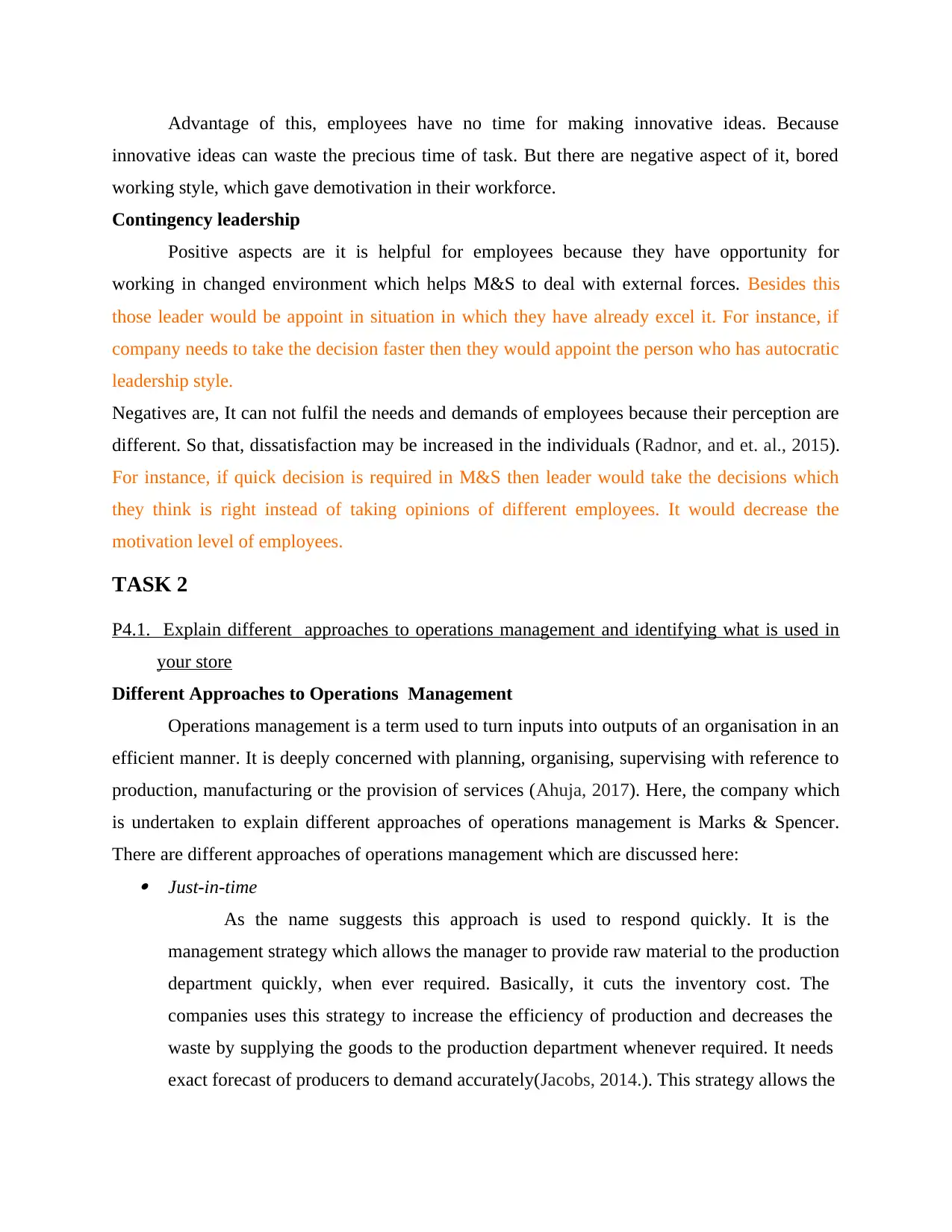
Advantage of this, employees have no time for making innovative ideas. Because
innovative ideas can waste the precious time of task. But there are negative aspect of it, bored
working style, which gave demotivation in their workforce.
Contingency leadership
Positive aspects are it is helpful for employees because they have opportunity for
working in changed environment which helps M&S to deal with external forces. Besides this
those leader would be appoint in situation in which they have already excel it. For instance, if
company needs to take the decision faster then they would appoint the person who has autocratic
leadership style.
Negatives are, It can not fulfil the needs and demands of employees because their perception are
different. So that, dissatisfaction may be increased in the individuals (Radnor, and et. al., 2015).
For instance, if quick decision is required in M&S then leader would take the decisions which
they think is right instead of taking opinions of different employees. It would decrease the
motivation level of employees.
TASK 2
P4.1. Explain different approaches to operations management and identifying what is used in
your store
Different Approaches to Operations Management
Operations management is a term used to turn inputs into outputs of an organisation in an
efficient manner. It is deeply concerned with planning, organising, supervising with reference to
production, manufacturing or the provision of services (Ahuja, 2017). Here, the company which
is undertaken to explain different approaches of operations management is Marks & Spencer.
There are different approaches of operations management which are discussed here: Just-in-time
As the name suggests this approach is used to respond quickly. It is the
management strategy which allows the manager to provide raw material to the production
department quickly, when ever required. Basically, it cuts the inventory cost. The
companies uses this strategy to increase the efficiency of production and decreases the
waste by supplying the goods to the production department whenever required. It needs
exact forecast of producers to demand accurately(Jacobs, 2014.). This strategy allows the
innovative ideas can waste the precious time of task. But there are negative aspect of it, bored
working style, which gave demotivation in their workforce.
Contingency leadership
Positive aspects are it is helpful for employees because they have opportunity for
working in changed environment which helps M&S to deal with external forces. Besides this
those leader would be appoint in situation in which they have already excel it. For instance, if
company needs to take the decision faster then they would appoint the person who has autocratic
leadership style.
Negatives are, It can not fulfil the needs and demands of employees because their perception are
different. So that, dissatisfaction may be increased in the individuals (Radnor, and et. al., 2015).
For instance, if quick decision is required in M&S then leader would take the decisions which
they think is right instead of taking opinions of different employees. It would decrease the
motivation level of employees.
TASK 2
P4.1. Explain different approaches to operations management and identifying what is used in
your store
Different Approaches to Operations Management
Operations management is a term used to turn inputs into outputs of an organisation in an
efficient manner. It is deeply concerned with planning, organising, supervising with reference to
production, manufacturing or the provision of services (Ahuja, 2017). Here, the company which
is undertaken to explain different approaches of operations management is Marks & Spencer.
There are different approaches of operations management which are discussed here: Just-in-time
As the name suggests this approach is used to respond quickly. It is the
management strategy which allows the manager to provide raw material to the production
department quickly, when ever required. Basically, it cuts the inventory cost. The
companies uses this strategy to increase the efficiency of production and decreases the
waste by supplying the goods to the production department whenever required. It needs
exact forecast of producers to demand accurately(Jacobs, 2014.). This strategy allows the
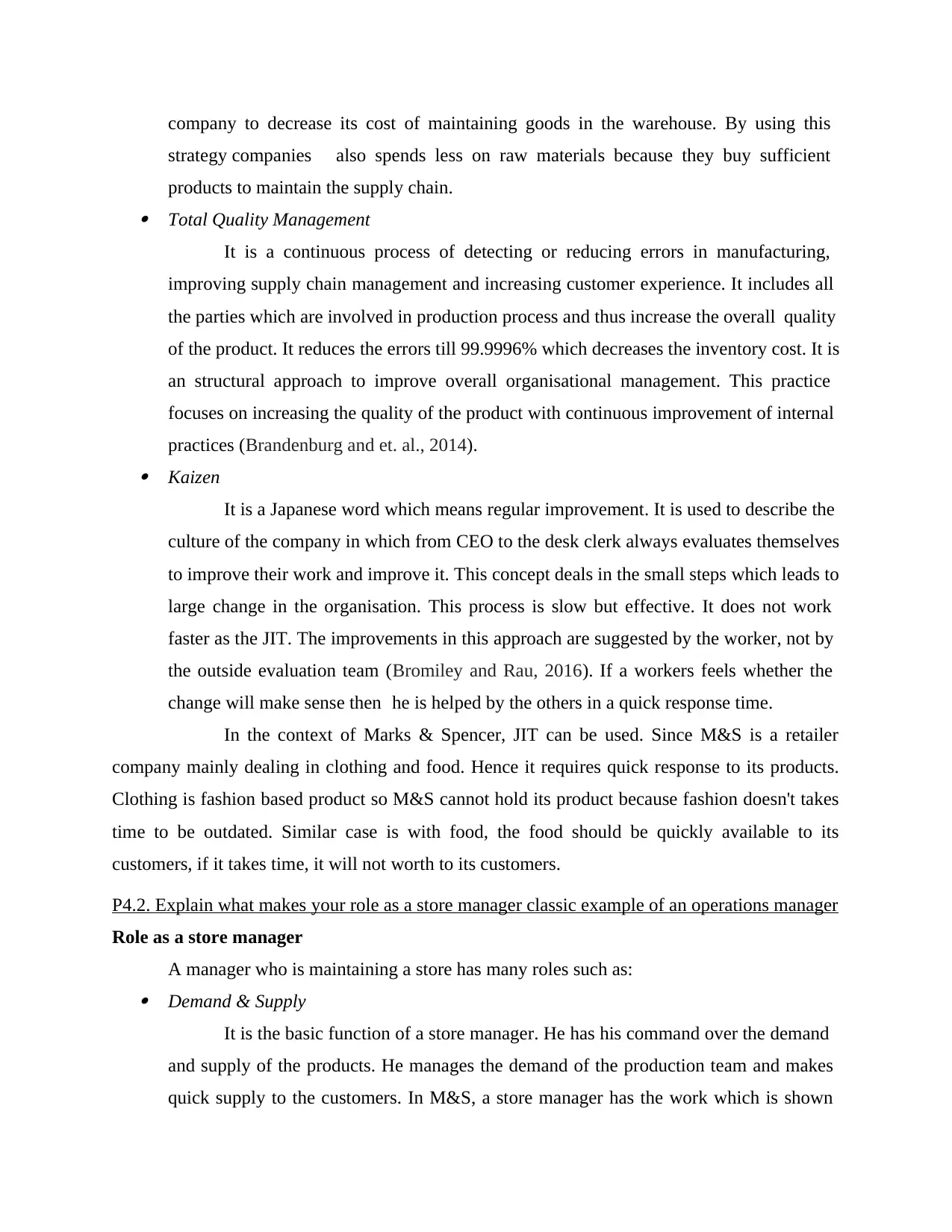
company to decrease its cost of maintaining goods in the warehouse. By using this
strategy companies also spends less on raw materials because they buy sufficient
products to maintain the supply chain. Total Quality Management
It is a continuous process of detecting or reducing errors in manufacturing,
improving supply chain management and increasing customer experience. It includes all
the parties which are involved in production process and thus increase the overall quality
of the product. It reduces the errors till 99.9996% which decreases the inventory cost. It is
an structural approach to improve overall organisational management. This practice
focuses on increasing the quality of the product with continuous improvement of internal
practices (Brandenburg and et. al., 2014). Kaizen
It is a Japanese word which means regular improvement. It is used to describe the
culture of the company in which from CEO to the desk clerk always evaluates themselves
to improve their work and improve it. This concept deals in the small steps which leads to
large change in the organisation. This process is slow but effective. It does not work
faster as the JIT. The improvements in this approach are suggested by the worker, not by
the outside evaluation team (Bromiley and Rau, 2016). If a workers feels whether the
change will make sense then he is helped by the others in a quick response time.
In the context of Marks & Spencer, JIT can be used. Since M&S is a retailer
company mainly dealing in clothing and food. Hence it requires quick response to its products.
Clothing is fashion based product so M&S cannot hold its product because fashion doesn't takes
time to be outdated. Similar case is with food, the food should be quickly available to its
customers, if it takes time, it will not worth to its customers.
P4.2. Explain what makes your role as a store manager classic example of an operations manager
Role as a store manager
A manager who is maintaining a store has many roles such as: Demand & Supply
It is the basic function of a store manager. He has his command over the demand
and supply of the products. He manages the demand of the production team and makes
quick supply to the customers. In M&S, a store manager has the work which is shown
strategy companies also spends less on raw materials because they buy sufficient
products to maintain the supply chain. Total Quality Management
It is a continuous process of detecting or reducing errors in manufacturing,
improving supply chain management and increasing customer experience. It includes all
the parties which are involved in production process and thus increase the overall quality
of the product. It reduces the errors till 99.9996% which decreases the inventory cost. It is
an structural approach to improve overall organisational management. This practice
focuses on increasing the quality of the product with continuous improvement of internal
practices (Brandenburg and et. al., 2014). Kaizen
It is a Japanese word which means regular improvement. It is used to describe the
culture of the company in which from CEO to the desk clerk always evaluates themselves
to improve their work and improve it. This concept deals in the small steps which leads to
large change in the organisation. This process is slow but effective. It does not work
faster as the JIT. The improvements in this approach are suggested by the worker, not by
the outside evaluation team (Bromiley and Rau, 2016). If a workers feels whether the
change will make sense then he is helped by the others in a quick response time.
In the context of Marks & Spencer, JIT can be used. Since M&S is a retailer
company mainly dealing in clothing and food. Hence it requires quick response to its products.
Clothing is fashion based product so M&S cannot hold its product because fashion doesn't takes
time to be outdated. Similar case is with food, the food should be quickly available to its
customers, if it takes time, it will not worth to its customers.
P4.2. Explain what makes your role as a store manager classic example of an operations manager
Role as a store manager
A manager who is maintaining a store has many roles such as: Demand & Supply
It is the basic function of a store manager. He has his command over the demand
and supply of the products. He manages the demand of the production team and makes
quick supply to the customers. In M&S, a store manager has the work which is shown
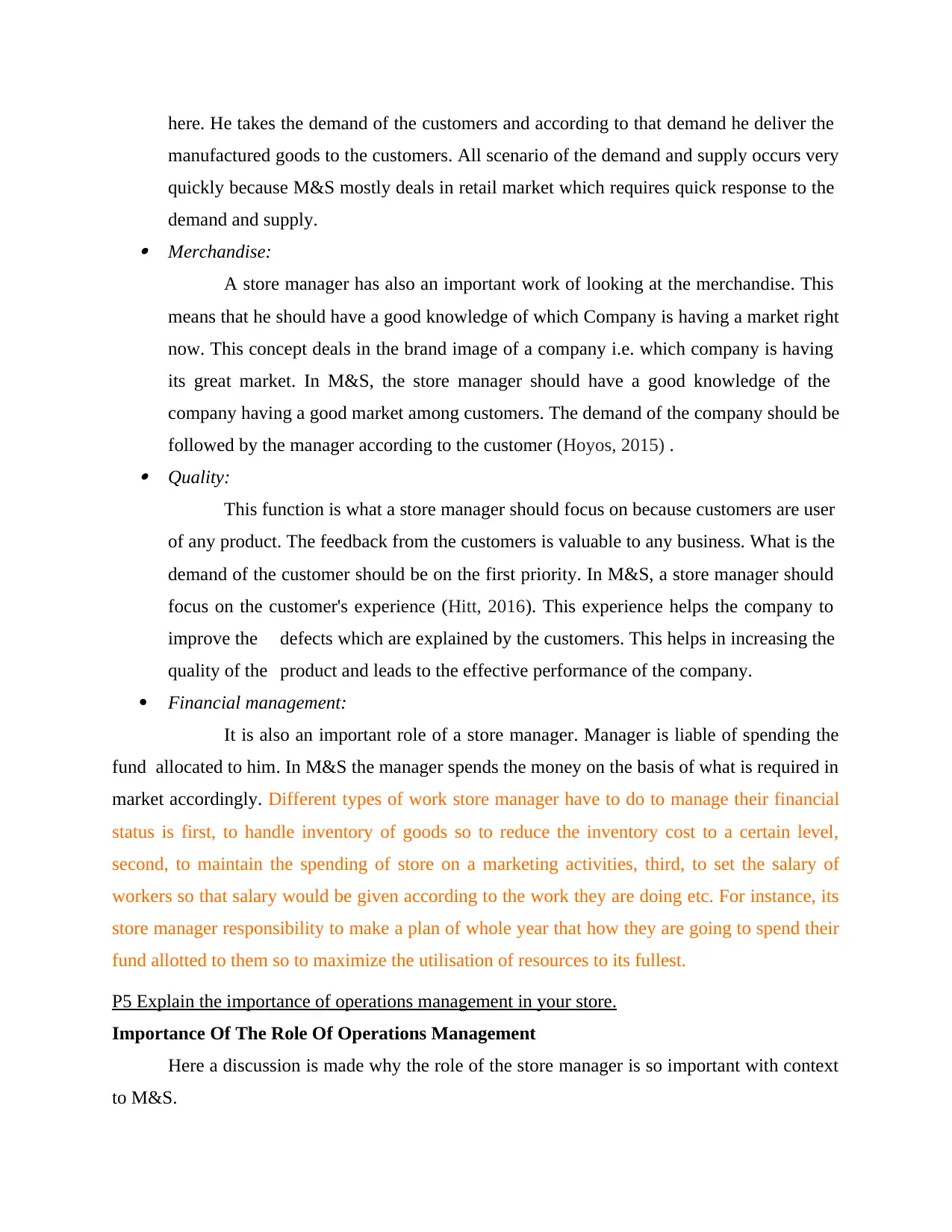
here. He takes the demand of the customers and according to that demand he deliver the
manufactured goods to the customers. All scenario of the demand and supply occurs very
quickly because M&S mostly deals in retail market which requires quick response to the
demand and supply. Merchandise:
A store manager has also an important work of looking at the merchandise. This
means that he should have a good knowledge of which Company is having a market right
now. This concept deals in the brand image of a company i.e. which company is having
its great market. In M&S, the store manager should have a good knowledge of the
company having a good market among customers. The demand of the company should be
followed by the manager according to the customer (Hoyos, 2015) . Quality:
This function is what a store manager should focus on because customers are user
of any product. The feedback from the customers is valuable to any business. What is the
demand of the customer should be on the first priority. In M&S, a store manager should
focus on the customer's experience (Hitt, 2016). This experience helps the company to
improve the defects which are explained by the customers. This helps in increasing the
quality of the product and leads to the effective performance of the company.
Financial management:
It is also an important role of a store manager. Manager is liable of spending the
fund allocated to him. In M&S the manager spends the money on the basis of what is required in
market accordingly. Different types of work store manager have to do to manage their financial
status is first, to handle inventory of goods so to reduce the inventory cost to a certain level,
second, to maintain the spending of store on a marketing activities, third, to set the salary of
workers so that salary would be given according to the work they are doing etc. For instance, its
store manager responsibility to make a plan of whole year that how they are going to spend their
fund allotted to them so to maximize the utilisation of resources to its fullest.
P5 Explain the importance of operations management in your store.
Importance Of The Role Of Operations Management
Here a discussion is made why the role of the store manager is so important with context
to M&S.
manufactured goods to the customers. All scenario of the demand and supply occurs very
quickly because M&S mostly deals in retail market which requires quick response to the
demand and supply. Merchandise:
A store manager has also an important work of looking at the merchandise. This
means that he should have a good knowledge of which Company is having a market right
now. This concept deals in the brand image of a company i.e. which company is having
its great market. In M&S, the store manager should have a good knowledge of the
company having a good market among customers. The demand of the company should be
followed by the manager according to the customer (Hoyos, 2015) . Quality:
This function is what a store manager should focus on because customers are user
of any product. The feedback from the customers is valuable to any business. What is the
demand of the customer should be on the first priority. In M&S, a store manager should
focus on the customer's experience (Hitt, 2016). This experience helps the company to
improve the defects which are explained by the customers. This helps in increasing the
quality of the product and leads to the effective performance of the company.
Financial management:
It is also an important role of a store manager. Manager is liable of spending the
fund allocated to him. In M&S the manager spends the money on the basis of what is required in
market accordingly. Different types of work store manager have to do to manage their financial
status is first, to handle inventory of goods so to reduce the inventory cost to a certain level,
second, to maintain the spending of store on a marketing activities, third, to set the salary of
workers so that salary would be given according to the work they are doing etc. For instance, its
store manager responsibility to make a plan of whole year that how they are going to spend their
fund allotted to them so to maximize the utilisation of resources to its fullest.
P5 Explain the importance of operations management in your store.
Importance Of The Role Of Operations Management
Here a discussion is made why the role of the store manager is so important with context
to M&S.
Secure Best Marks with AI Grader
Need help grading? Try our AI Grader for instant feedback on your assignments.
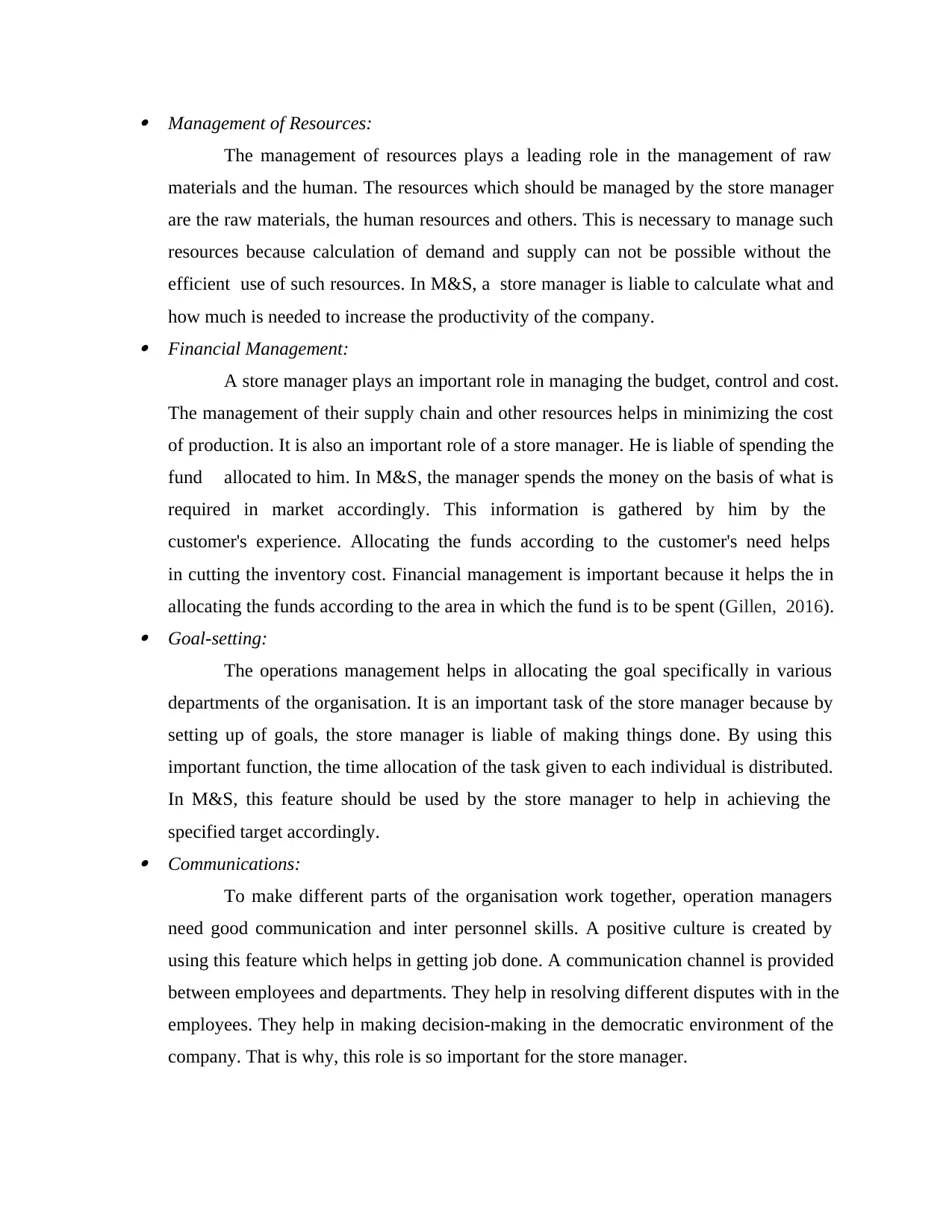
Management of Resources:
The management of resources plays a leading role in the management of raw
materials and the human. The resources which should be managed by the store manager
are the raw materials, the human resources and others. This is necessary to manage such
resources because calculation of demand and supply can not be possible without the
efficient use of such resources. In M&S, a store manager is liable to calculate what and
how much is needed to increase the productivity of the company. Financial Management:
A store manager plays an important role in managing the budget, control and cost.
The management of their supply chain and other resources helps in minimizing the cost
of production. It is also an important role of a store manager. He is liable of spending the
fund allocated to him. In M&S, the manager spends the money on the basis of what is
required in market accordingly. This information is gathered by him by the
customer's experience. Allocating the funds according to the customer's need helps
in cutting the inventory cost. Financial management is important because it helps the in
allocating the funds according to the area in which the fund is to be spent (Gillen, 2016). Goal-setting:
The operations management helps in allocating the goal specifically in various
departments of the organisation. It is an important task of the store manager because by
setting up of goals, the store manager is liable of making things done. By using this
important function, the time allocation of the task given to each individual is distributed.
In M&S, this feature should be used by the store manager to help in achieving the
specified target accordingly. Communications:
To make different parts of the organisation work together, operation managers
need good communication and inter personnel skills. A positive culture is created by
using this feature which helps in getting job done. A communication channel is provided
between employees and departments. They help in resolving different disputes with in the
employees. They help in making decision-making in the democratic environment of the
company. That is why, this role is so important for the store manager.
The management of resources plays a leading role in the management of raw
materials and the human. The resources which should be managed by the store manager
are the raw materials, the human resources and others. This is necessary to manage such
resources because calculation of demand and supply can not be possible without the
efficient use of such resources. In M&S, a store manager is liable to calculate what and
how much is needed to increase the productivity of the company. Financial Management:
A store manager plays an important role in managing the budget, control and cost.
The management of their supply chain and other resources helps in minimizing the cost
of production. It is also an important role of a store manager. He is liable of spending the
fund allocated to him. In M&S, the manager spends the money on the basis of what is
required in market accordingly. This information is gathered by him by the
customer's experience. Allocating the funds according to the customer's need helps
in cutting the inventory cost. Financial management is important because it helps the in
allocating the funds according to the area in which the fund is to be spent (Gillen, 2016). Goal-setting:
The operations management helps in allocating the goal specifically in various
departments of the organisation. It is an important task of the store manager because by
setting up of goals, the store manager is liable of making things done. By using this
important function, the time allocation of the task given to each individual is distributed.
In M&S, this feature should be used by the store manager to help in achieving the
specified target accordingly. Communications:
To make different parts of the organisation work together, operation managers
need good communication and inter personnel skills. A positive culture is created by
using this feature which helps in getting job done. A communication channel is provided
between employees and departments. They help in resolving different disputes with in the
employees. They help in making decision-making in the democratic environment of the
company. That is why, this role is so important for the store manager.
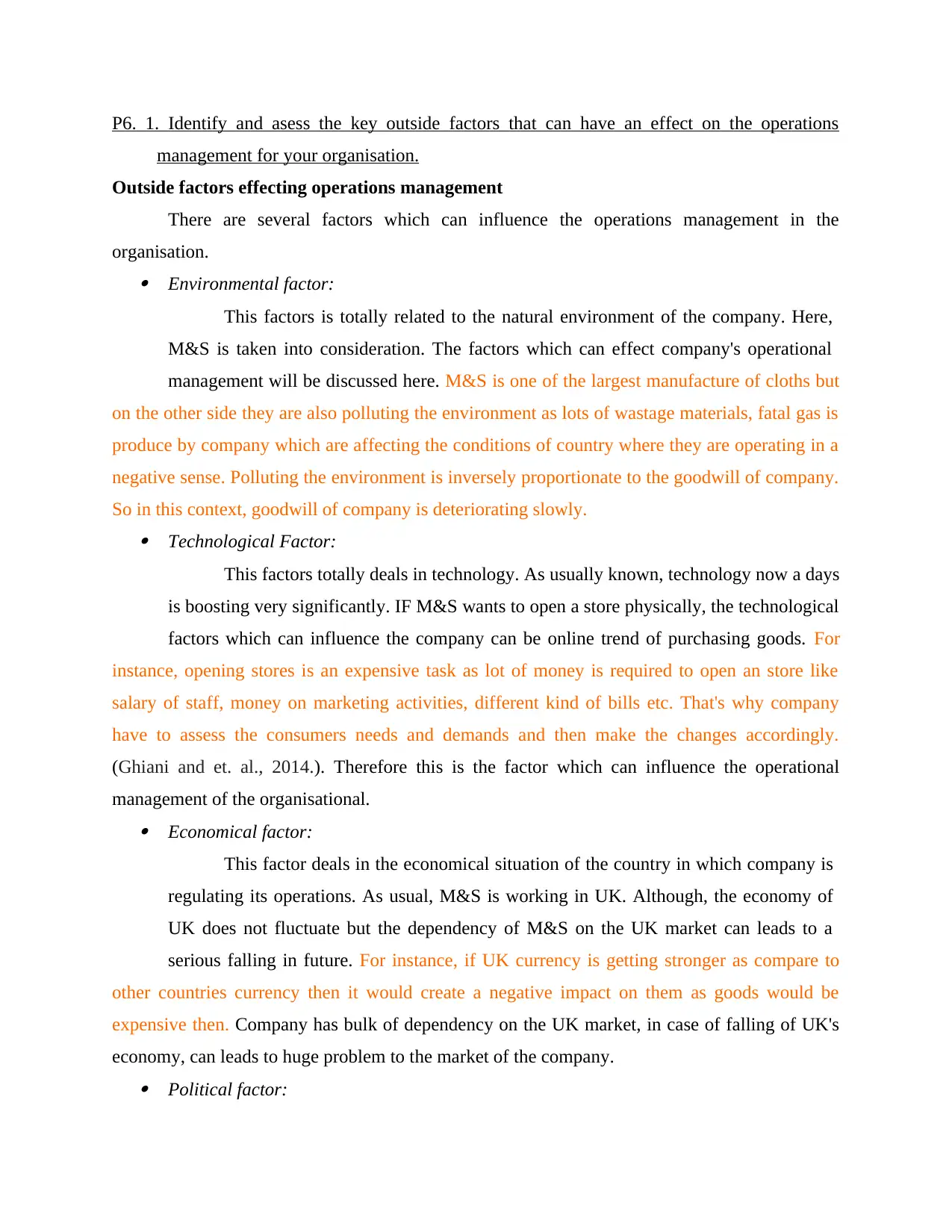
P6. 1. Identify and asess the key outside factors that can have an effect on the operations
management for your organisation.
Outside factors effecting operations management
There are several factors which can influence the operations management in the
organisation. Environmental factor:
This factors is totally related to the natural environment of the company. Here,
M&S is taken into consideration. The factors which can effect company's operational
management will be discussed here. M&S is one of the largest manufacture of cloths but
on the other side they are also polluting the environment as lots of wastage materials, fatal gas is
produce by company which are affecting the conditions of country where they are operating in a
negative sense. Polluting the environment is inversely proportionate to the goodwill of company.
So in this context, goodwill of company is deteriorating slowly. Technological Factor:
This factors totally deals in technology. As usually known, technology now a days
is boosting very significantly. IF M&S wants to open a store physically, the technological
factors which can influence the company can be online trend of purchasing goods. For
instance, opening stores is an expensive task as lot of money is required to open an store like
salary of staff, money on marketing activities, different kind of bills etc. That's why company
have to assess the consumers needs and demands and then make the changes accordingly.
(Ghiani and et. al., 2014.). Therefore this is the factor which can influence the operational
management of the organisational. Economical factor:
This factor deals in the economical situation of the country in which company is
regulating its operations. As usual, M&S is working in UK. Although, the economy of
UK does not fluctuate but the dependency of M&S on the UK market can leads to a
serious falling in future. For instance, if UK currency is getting stronger as compare to
other countries currency then it would create a negative impact on them as goods would be
expensive then. Company has bulk of dependency on the UK market, in case of falling of UK's
economy, can leads to huge problem to the market of the company. Political factor:
management for your organisation.
Outside factors effecting operations management
There are several factors which can influence the operations management in the
organisation. Environmental factor:
This factors is totally related to the natural environment of the company. Here,
M&S is taken into consideration. The factors which can effect company's operational
management will be discussed here. M&S is one of the largest manufacture of cloths but
on the other side they are also polluting the environment as lots of wastage materials, fatal gas is
produce by company which are affecting the conditions of country where they are operating in a
negative sense. Polluting the environment is inversely proportionate to the goodwill of company.
So in this context, goodwill of company is deteriorating slowly. Technological Factor:
This factors totally deals in technology. As usually known, technology now a days
is boosting very significantly. IF M&S wants to open a store physically, the technological
factors which can influence the company can be online trend of purchasing goods. For
instance, opening stores is an expensive task as lot of money is required to open an store like
salary of staff, money on marketing activities, different kind of bills etc. That's why company
have to assess the consumers needs and demands and then make the changes accordingly.
(Ghiani and et. al., 2014.). Therefore this is the factor which can influence the operational
management of the organisational. Economical factor:
This factor deals in the economical situation of the country in which company is
regulating its operations. As usual, M&S is working in UK. Although, the economy of
UK does not fluctuate but the dependency of M&S on the UK market can leads to a
serious falling in future. For instance, if UK currency is getting stronger as compare to
other countries currency then it would create a negative impact on them as goods would be
expensive then. Company has bulk of dependency on the UK market, in case of falling of UK's
economy, can leads to huge problem to the market of the company. Political factor:
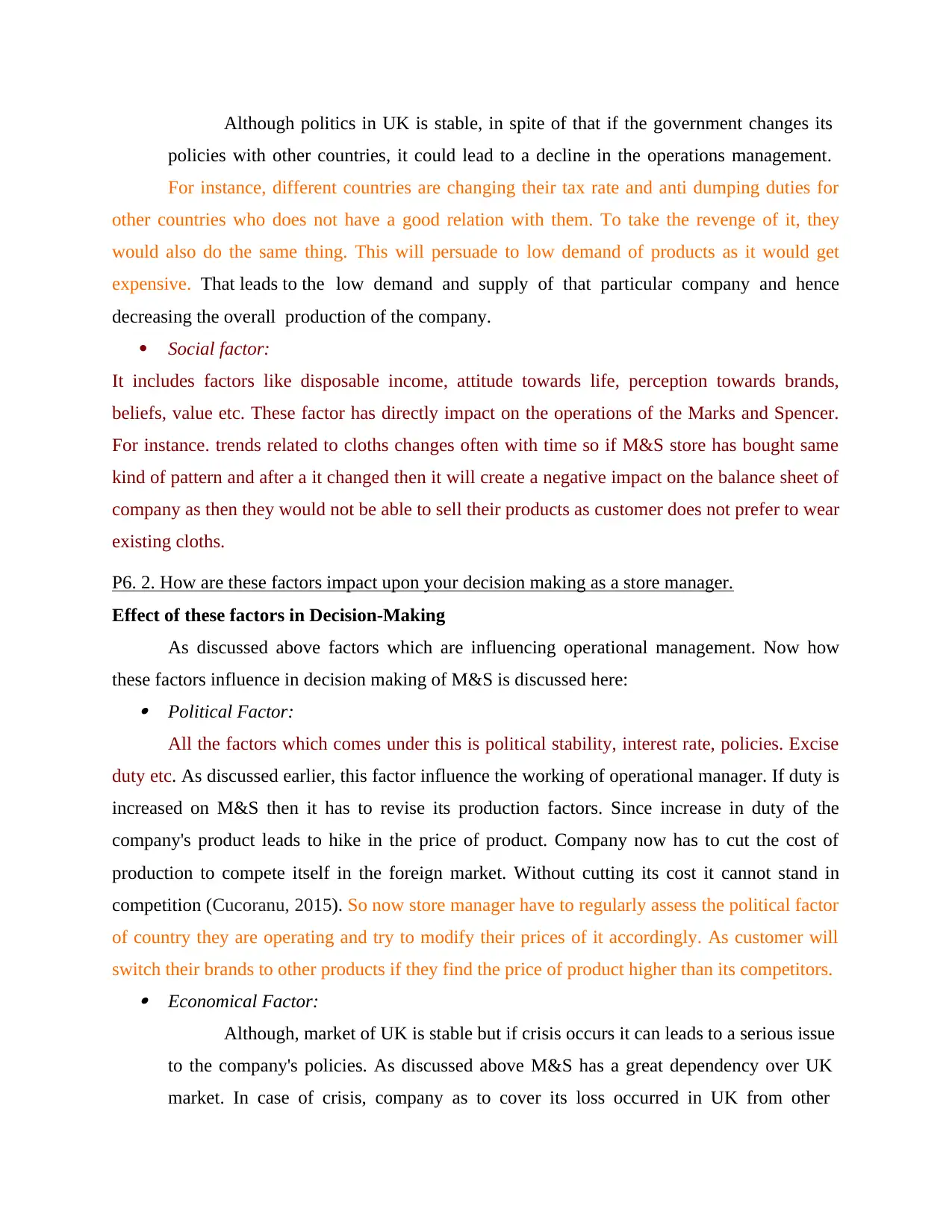
Although politics in UK is stable, in spite of that if the government changes its
policies with other countries, it could lead to a decline in the operations management.
For instance, different countries are changing their tax rate and anti dumping duties for
other countries who does not have a good relation with them. To take the revenge of it, they
would also do the same thing. This will persuade to low demand of products as it would get
expensive. That leads to the low demand and supply of that particular company and hence
decreasing the overall production of the company.
Social factor:
It includes factors like disposable income, attitude towards life, perception towards brands,
beliefs, value etc. These factor has directly impact on the operations of the Marks and Spencer.
For instance. trends related to cloths changes often with time so if M&S store has bought same
kind of pattern and after a it changed then it will create a negative impact on the balance sheet of
company as then they would not be able to sell their products as customer does not prefer to wear
existing cloths.
P6. 2. How are these factors impact upon your decision making as a store manager.
Effect of these factors in Decision-Making
As discussed above factors which are influencing operational management. Now how
these factors influence in decision making of M&S is discussed here: Political Factor:
All the factors which comes under this is political stability, interest rate, policies. Excise
duty etc. As discussed earlier, this factor influence the working of operational manager. If duty is
increased on M&S then it has to revise its production factors. Since increase in duty of the
company's product leads to hike in the price of product. Company now has to cut the cost of
production to compete itself in the foreign market. Without cutting its cost it cannot stand in
competition (Cucoranu, 2015). So now store manager have to regularly assess the political factor
of country they are operating and try to modify their prices of it accordingly. As customer will
switch their brands to other products if they find the price of product higher than its competitors. Economical Factor:
Although, market of UK is stable but if crisis occurs it can leads to a serious issue
to the company's policies. As discussed above M&S has a great dependency over UK
market. In case of crisis, company as to cover its loss occurred in UK from other
policies with other countries, it could lead to a decline in the operations management.
For instance, different countries are changing their tax rate and anti dumping duties for
other countries who does not have a good relation with them. To take the revenge of it, they
would also do the same thing. This will persuade to low demand of products as it would get
expensive. That leads to the low demand and supply of that particular company and hence
decreasing the overall production of the company.
Social factor:
It includes factors like disposable income, attitude towards life, perception towards brands,
beliefs, value etc. These factor has directly impact on the operations of the Marks and Spencer.
For instance. trends related to cloths changes often with time so if M&S store has bought same
kind of pattern and after a it changed then it will create a negative impact on the balance sheet of
company as then they would not be able to sell their products as customer does not prefer to wear
existing cloths.
P6. 2. How are these factors impact upon your decision making as a store manager.
Effect of these factors in Decision-Making
As discussed above factors which are influencing operational management. Now how
these factors influence in decision making of M&S is discussed here: Political Factor:
All the factors which comes under this is political stability, interest rate, policies. Excise
duty etc. As discussed earlier, this factor influence the working of operational manager. If duty is
increased on M&S then it has to revise its production factors. Since increase in duty of the
company's product leads to hike in the price of product. Company now has to cut the cost of
production to compete itself in the foreign market. Without cutting its cost it cannot stand in
competition (Cucoranu, 2015). So now store manager have to regularly assess the political factor
of country they are operating and try to modify their prices of it accordingly. As customer will
switch their brands to other products if they find the price of product higher than its competitors. Economical Factor:
Although, market of UK is stable but if crisis occurs it can leads to a serious issue
to the company's policies. As discussed above M&S has a great dependency over UK
market. In case of crisis, company as to cover its loss occurred in UK from other
Paraphrase This Document
Need a fresh take? Get an instant paraphrase of this document with our AI Paraphraser
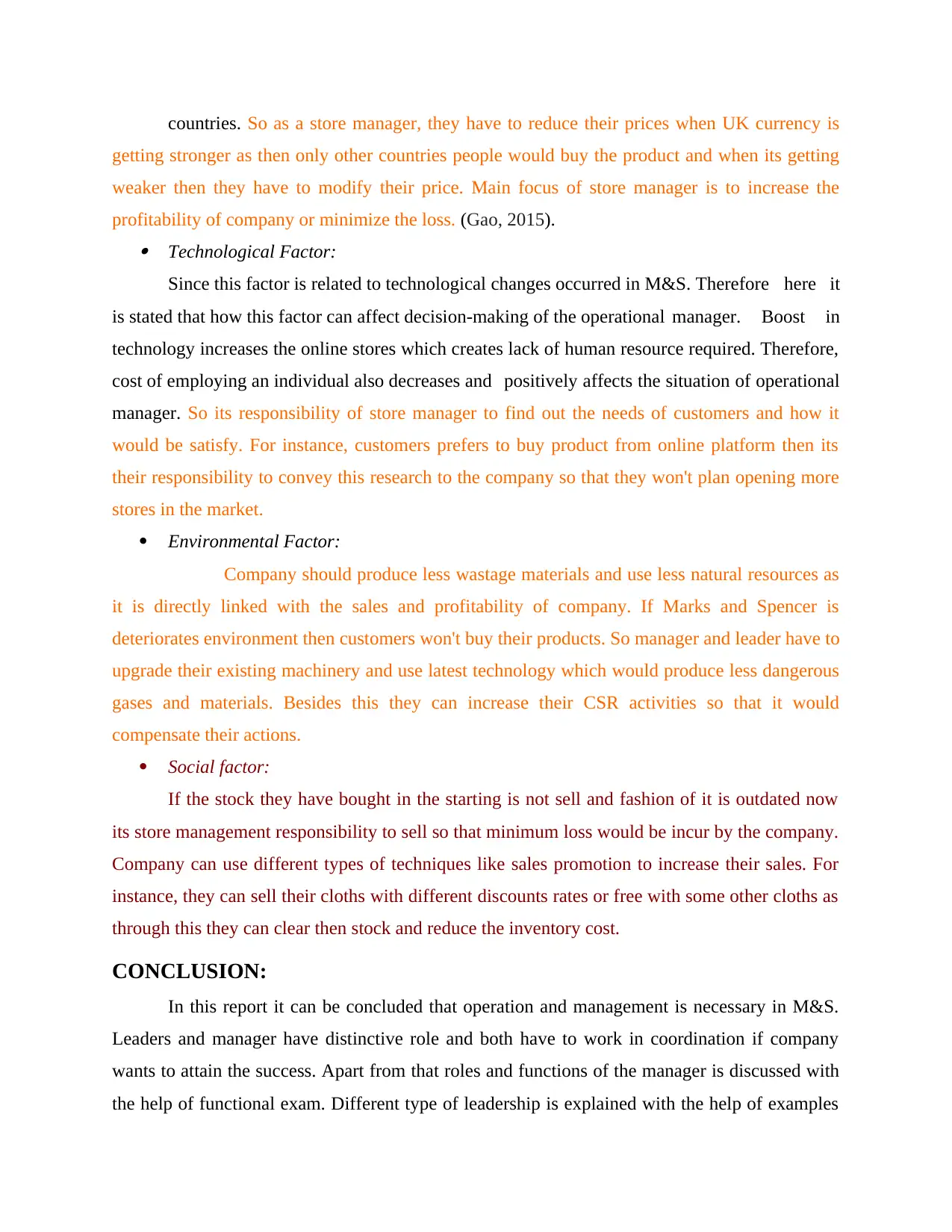
countries. So as a store manager, they have to reduce their prices when UK currency is
getting stronger as then only other countries people would buy the product and when its getting
weaker then they have to modify their price. Main focus of store manager is to increase the
profitability of company or minimize the loss. (Gao, 2015). Technological Factor:
Since this factor is related to technological changes occurred in M&S. Therefore here it
is stated that how this factor can affect decision-making of the operational manager. Boost in
technology increases the online stores which creates lack of human resource required. Therefore,
cost of employing an individual also decreases and positively affects the situation of operational
manager. So its responsibility of store manager to find out the needs of customers and how it
would be satisfy. For instance, customers prefers to buy product from online platform then its
their responsibility to convey this research to the company so that they won't plan opening more
stores in the market.
Environmental Factor:
Company should produce less wastage materials and use less natural resources as
it is directly linked with the sales and profitability of company. If Marks and Spencer is
deteriorates environment then customers won't buy their products. So manager and leader have to
upgrade their existing machinery and use latest technology which would produce less dangerous
gases and materials. Besides this they can increase their CSR activities so that it would
compensate their actions.
Social factor:
If the stock they have bought in the starting is not sell and fashion of it is outdated now
its store management responsibility to sell so that minimum loss would be incur by the company.
Company can use different types of techniques like sales promotion to increase their sales. For
instance, they can sell their cloths with different discounts rates or free with some other cloths as
through this they can clear then stock and reduce the inventory cost.
CONCLUSION:
In this report it can be concluded that operation and management is necessary in M&S.
Leaders and manager have distinctive role and both have to work in coordination if company
wants to attain the success. Apart from that roles and functions of the manager is discussed with
the help of functional exam. Different type of leadership is explained with the help of examples
getting stronger as then only other countries people would buy the product and when its getting
weaker then they have to modify their price. Main focus of store manager is to increase the
profitability of company or minimize the loss. (Gao, 2015). Technological Factor:
Since this factor is related to technological changes occurred in M&S. Therefore here it
is stated that how this factor can affect decision-making of the operational manager. Boost in
technology increases the online stores which creates lack of human resource required. Therefore,
cost of employing an individual also decreases and positively affects the situation of operational
manager. So its responsibility of store manager to find out the needs of customers and how it
would be satisfy. For instance, customers prefers to buy product from online platform then its
their responsibility to convey this research to the company so that they won't plan opening more
stores in the market.
Environmental Factor:
Company should produce less wastage materials and use less natural resources as
it is directly linked with the sales and profitability of company. If Marks and Spencer is
deteriorates environment then customers won't buy their products. So manager and leader have to
upgrade their existing machinery and use latest technology which would produce less dangerous
gases and materials. Besides this they can increase their CSR activities so that it would
compensate their actions.
Social factor:
If the stock they have bought in the starting is not sell and fashion of it is outdated now
its store management responsibility to sell so that minimum loss would be incur by the company.
Company can use different types of techniques like sales promotion to increase their sales. For
instance, they can sell their cloths with different discounts rates or free with some other cloths as
through this they can clear then stock and reduce the inventory cost.
CONCLUSION:
In this report it can be concluded that operation and management is necessary in M&S.
Leaders and manager have distinctive role and both have to work in coordination if company
wants to attain the success. Apart from that roles and functions of the manager is discussed with
the help of functional exam. Different type of leadership is explained with the help of examples
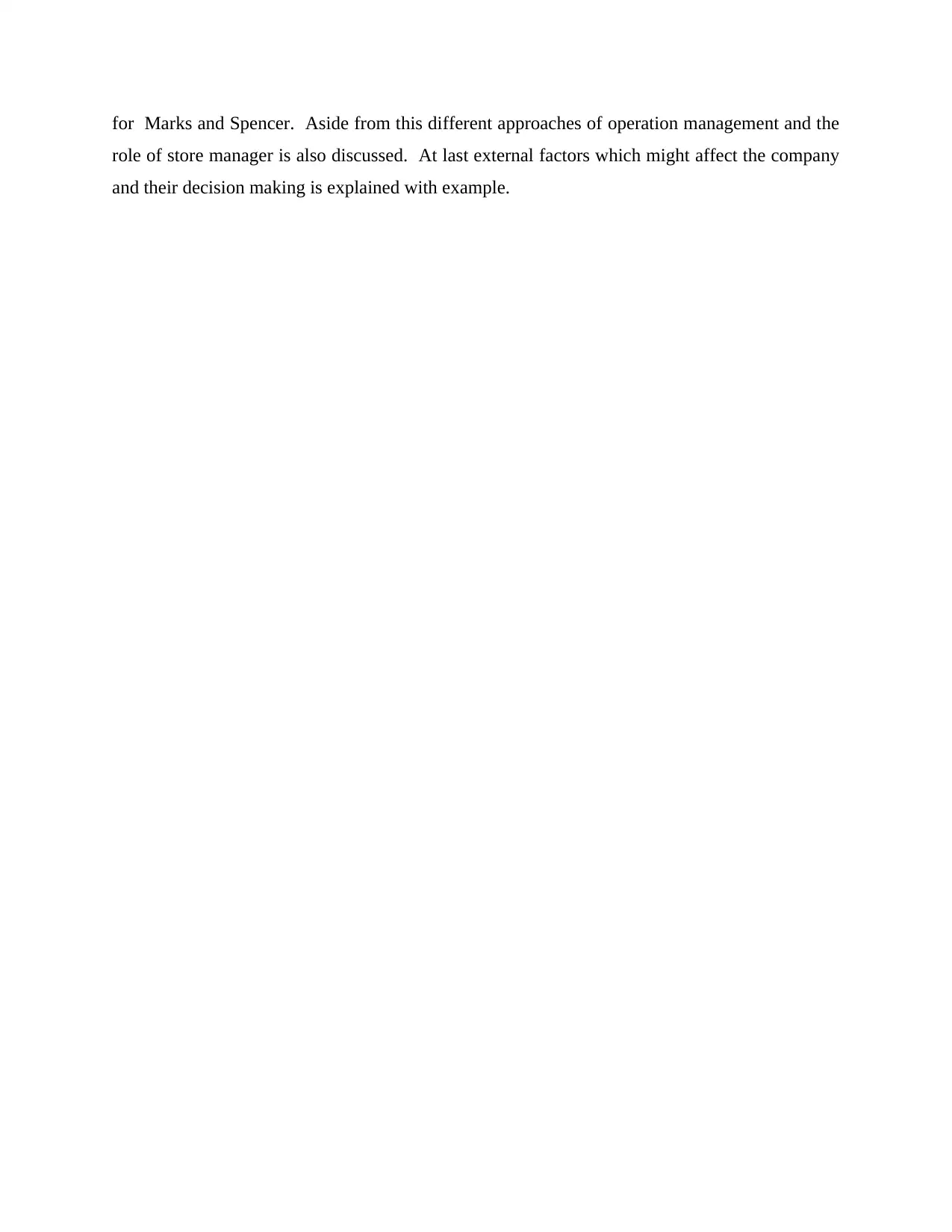
for Marks and Spencer. Aside from this different approaches of operation management and the
role of store manager is also discussed. At last external factors which might affect the company
and their decision making is explained with example.
role of store manager is also discussed. At last external factors which might affect the company
and their decision making is explained with example.
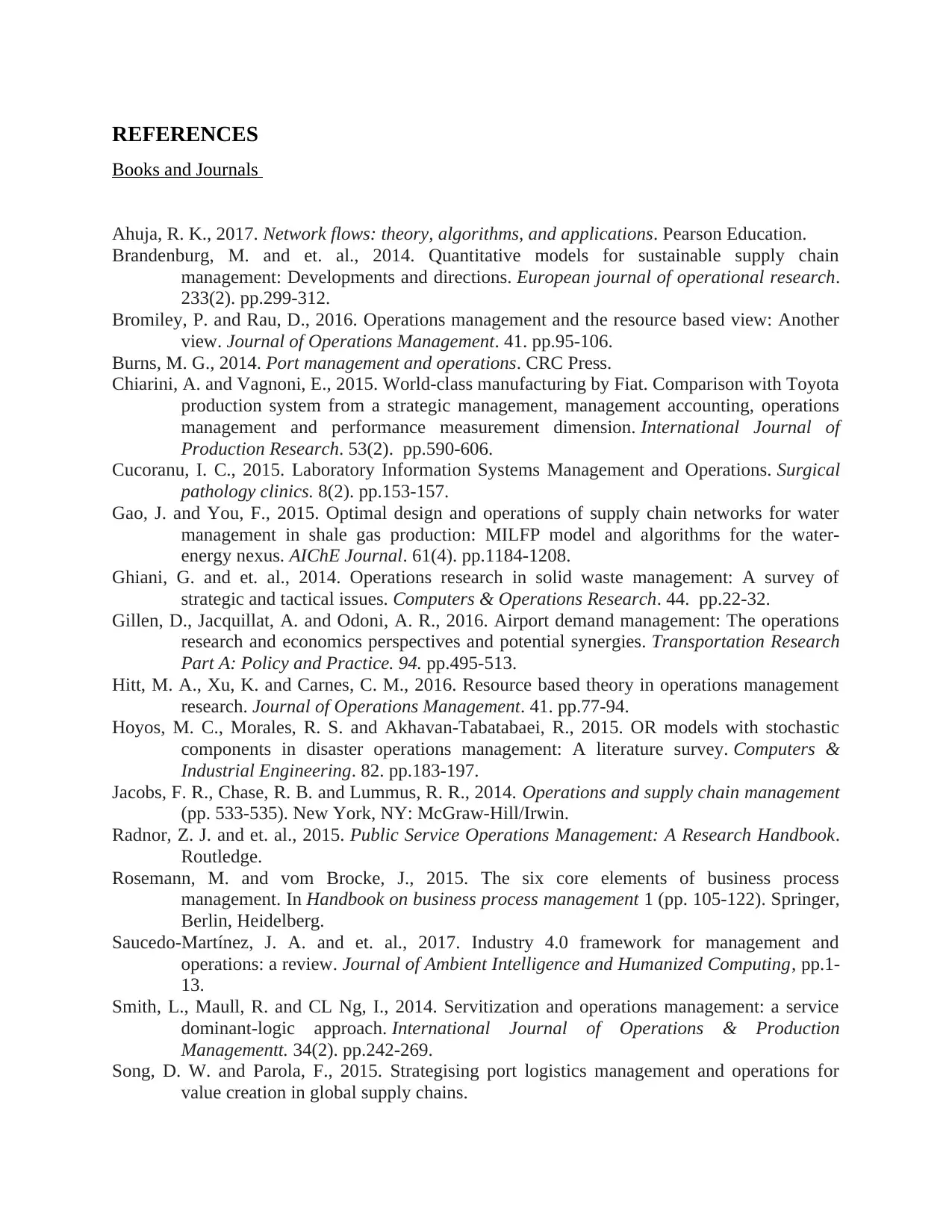
REFERENCES
Books and Journals
Ahuja, R. K., 2017. Network flows: theory, algorithms, and applications. Pearson Education.
Brandenburg, M. and et. al., 2014. Quantitative models for sustainable supply chain
management: Developments and directions. European journal of operational research.
233(2). pp.299-312.
Bromiley, P. and Rau, D., 2016. Operations management and the resource based view: Another
view. Journal of Operations Management. 41. pp.95-106.
Burns, M. G., 2014. Port management and operations. CRC Press.
Chiarini, A. and Vagnoni, E., 2015. World-class manufacturing by Fiat. Comparison with Toyota
production system from a strategic management, management accounting, operations
management and performance measurement dimension. International Journal of
Production Research. 53(2). pp.590-606.
Cucoranu, I. C., 2015. Laboratory Information Systems Management and Operations. Surgical
pathology clinics. 8(2). pp.153-157.
Gao, J. and You, F., 2015. Optimal design and operations of supply chain networks for water
management in shale gas production: MILFP model and algorithms for the water‐
energy nexus. AIChE Journal. 61(4). pp.1184-1208.
Ghiani, G. and et. al., 2014. Operations research in solid waste management: A survey of
strategic and tactical issues. Computers & Operations Research. 44. pp.22-32.
Gillen, D., Jacquillat, A. and Odoni, A. R., 2016. Airport demand management: The operations
research and economics perspectives and potential synergies. Transportation Research
Part A: Policy and Practice. 94. pp.495-513.
Hitt, M. A., Xu, K. and Carnes, C. M., 2016. Resource based theory in operations management
research. Journal of Operations Management. 41. pp.77-94.
Hoyos, M. C., Morales, R. S. and Akhavan-Tabatabaei, R., 2015. OR models with stochastic
components in disaster operations management: A literature survey. Computers &
Industrial Engineering. 82. pp.183-197.
Jacobs, F. R., Chase, R. B. and Lummus, R. R., 2014. Operations and supply chain management
(pp. 533-535). New York, NY: McGraw-Hill/Irwin.
Radnor, Z. J. and et. al., 2015. Public Service Operations Management: A Research Handbook.
Routledge.
Rosemann, M. and vom Brocke, J., 2015. The six core elements of business process
management. In Handbook on business process management 1 (pp. 105-122). Springer,
Berlin, Heidelberg.
Saucedo-Martínez, J. A. and et. al., 2017. Industry 4.0 framework for management and
operations: a review. Journal of Ambient Intelligence and Humanized Computing, pp.1-
13.
Smith, L., Maull, R. and CL Ng, I., 2014. Servitization and operations management: a service
dominant-logic approach. International Journal of Operations & Production
Managementt. 34(2). pp.242-269.
Song, D. W. and Parola, F., 2015. Strategising port logistics management and operations for
value creation in global supply chains.
Books and Journals
Ahuja, R. K., 2017. Network flows: theory, algorithms, and applications. Pearson Education.
Brandenburg, M. and et. al., 2014. Quantitative models for sustainable supply chain
management: Developments and directions. European journal of operational research.
233(2). pp.299-312.
Bromiley, P. and Rau, D., 2016. Operations management and the resource based view: Another
view. Journal of Operations Management. 41. pp.95-106.
Burns, M. G., 2014. Port management and operations. CRC Press.
Chiarini, A. and Vagnoni, E., 2015. World-class manufacturing by Fiat. Comparison with Toyota
production system from a strategic management, management accounting, operations
management and performance measurement dimension. International Journal of
Production Research. 53(2). pp.590-606.
Cucoranu, I. C., 2015. Laboratory Information Systems Management and Operations. Surgical
pathology clinics. 8(2). pp.153-157.
Gao, J. and You, F., 2015. Optimal design and operations of supply chain networks for water
management in shale gas production: MILFP model and algorithms for the water‐
energy nexus. AIChE Journal. 61(4). pp.1184-1208.
Ghiani, G. and et. al., 2014. Operations research in solid waste management: A survey of
strategic and tactical issues. Computers & Operations Research. 44. pp.22-32.
Gillen, D., Jacquillat, A. and Odoni, A. R., 2016. Airport demand management: The operations
research and economics perspectives and potential synergies. Transportation Research
Part A: Policy and Practice. 94. pp.495-513.
Hitt, M. A., Xu, K. and Carnes, C. M., 2016. Resource based theory in operations management
research. Journal of Operations Management. 41. pp.77-94.
Hoyos, M. C., Morales, R. S. and Akhavan-Tabatabaei, R., 2015. OR models with stochastic
components in disaster operations management: A literature survey. Computers &
Industrial Engineering. 82. pp.183-197.
Jacobs, F. R., Chase, R. B. and Lummus, R. R., 2014. Operations and supply chain management
(pp. 533-535). New York, NY: McGraw-Hill/Irwin.
Radnor, Z. J. and et. al., 2015. Public Service Operations Management: A Research Handbook.
Routledge.
Rosemann, M. and vom Brocke, J., 2015. The six core elements of business process
management. In Handbook on business process management 1 (pp. 105-122). Springer,
Berlin, Heidelberg.
Saucedo-Martínez, J. A. and et. al., 2017. Industry 4.0 framework for management and
operations: a review. Journal of Ambient Intelligence and Humanized Computing, pp.1-
13.
Smith, L., Maull, R. and CL Ng, I., 2014. Servitization and operations management: a service
dominant-logic approach. International Journal of Operations & Production
Managementt. 34(2). pp.242-269.
Song, D. W. and Parola, F., 2015. Strategising port logistics management and operations for
value creation in global supply chains.
Secure Best Marks with AI Grader
Need help grading? Try our AI Grader for instant feedback on your assignments.
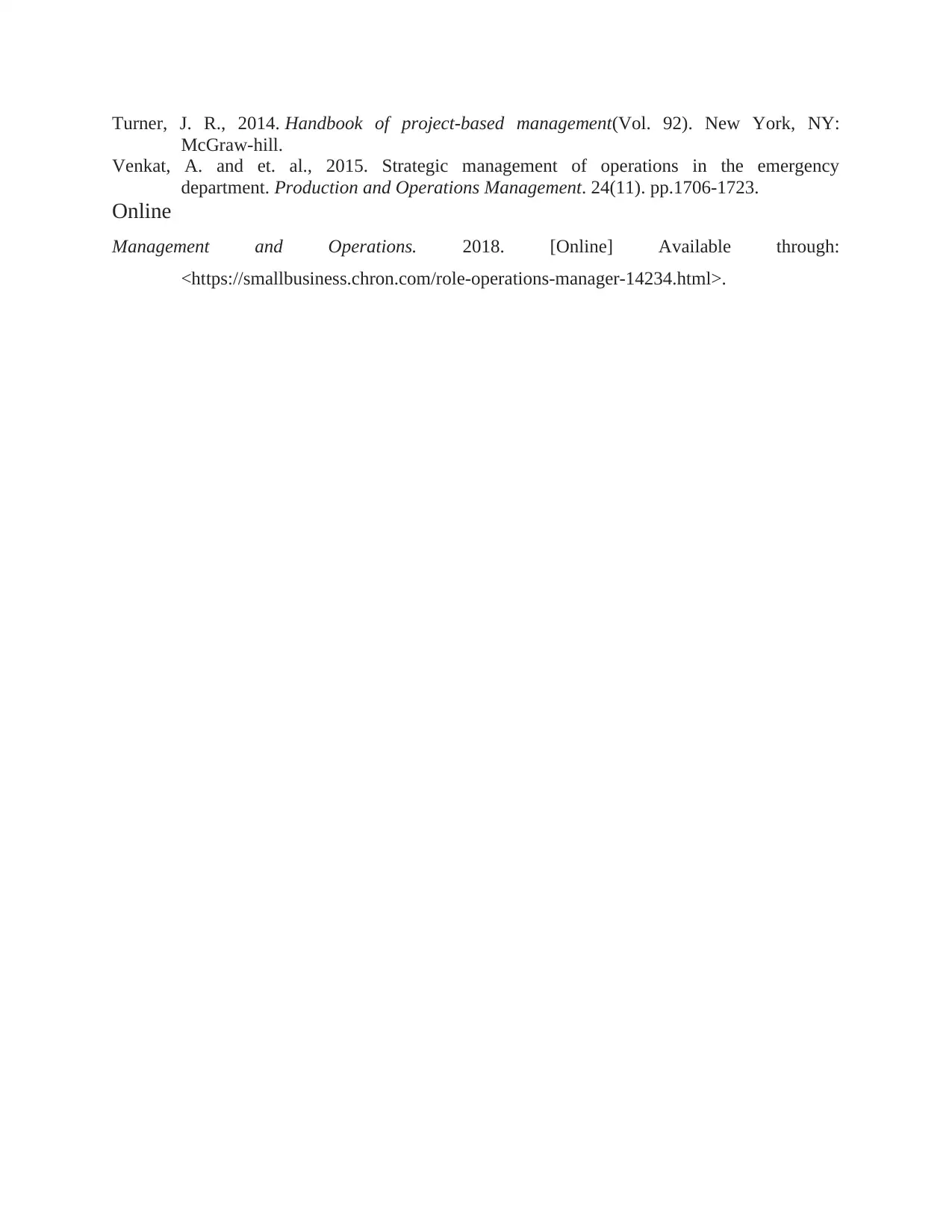
Turner, J. R., 2014. Handbook of project-based management(Vol. 92). New York, NY:
McGraw-hill.
Venkat, A. and et. al., 2015. Strategic management of operations in the emergency
department. Production and Operations Management. 24(11). pp.1706-1723.
Online
Management and Operations. 2018. [Online] Available through:
<https://smallbusiness.chron.com/role-operations-manager-14234.html>.
McGraw-hill.
Venkat, A. and et. al., 2015. Strategic management of operations in the emergency
department. Production and Operations Management. 24(11). pp.1706-1723.
Online
Management and Operations. 2018. [Online] Available through:
<https://smallbusiness.chron.com/role-operations-manager-14234.html>.
1 out of 17
Related Documents
Your All-in-One AI-Powered Toolkit for Academic Success.
+13062052269
info@desklib.com
Available 24*7 on WhatsApp / Email
![[object Object]](/_next/static/media/star-bottom.7253800d.svg)
Unlock your academic potential
© 2024 | Zucol Services PVT LTD | All rights reserved.





